#plot analysis
Explore tagged Tumblr posts
Text
Thinking about self hatred and how it's such a plague in Blue Lock. Thinking about how Rin can't look in the mirror because of how much he reminds himself of Sae, but how he tells Isagi to look at him. How even characters who think of themselves as filth get angry, how Kenyu has bursts of it, how Kaiser chokes himself. How deep down every single character in Blue Lock is begging to be loved and understood. The light in their eyes when someone believes in them and the deep pit of depression they fall into when no one does.
How Reo and Ness are hated by parts of the fandom probably BECAUSE their self hatred is so viceral and so obvious you can fucking feel it. Yet characters like Barou and Kunigami are seen as edgy because they hide their self hatred behind an equally destructive facade, a mask of controlled apathy for those around them. The way the coaches have to cradle the fragile, fragile souls of these boys while still pushing them to be better. Begging them to believe they are capable and picking them up after they pass out, stopping them from falling into the same imposter syndrome they've witnessed again and again (that even they are not immune to).
Thinking about how even Ego Jinpachi doesn't take care of himself.
#hmmm#blue lock#bllk#blue lock manga#plot analysis#character analysis#character examination#bluelock#kunigami rensuke#rin itoshi#barou shouei#alexis ness#bllk kaiser#ego jinpachi
985 notes
·
View notes
Text
Y'know...everyone thinks Betelgeuse holds back with Lydia in the first Beetlejuice because she's a child, "it was a green card thing", he wasn't interested in her that way blah blah blah insert reason here. Codswallop in my opinion. I think it's the exact opposite.
This is a coming of age film. There's a reason it's constantly compared to Labyrinth. It's all about Lydia coming into her own sexuality.
Horndogging is half of Betelgeuse's personality, but he doesn't give her any of that. Instead, the mask drops and she gets his true self.
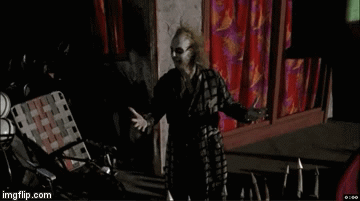
Because he's actually trying to seduce her.
He's not interested in a copping a quick feel or getting a cheap scare, not if it would lose her trust. As shown in Beetlejuice Beetlejuice, he's in it for the longhaul and always was.
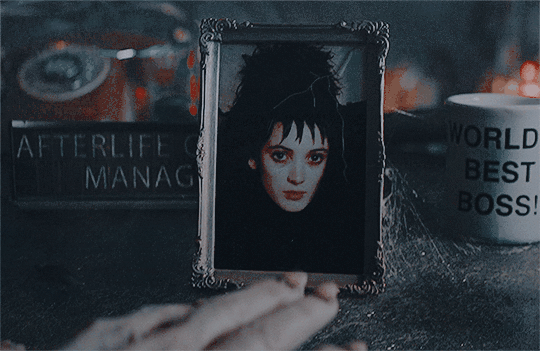
He legitimately wants to sleep with her and is taking the steps necessary to achieve that goal.
187 notes
·
View notes
Text
milchick nation status report (or: what s2e7 means for everyone that wasn't in it)
reddit is a lot better at connecting dots and deciphering inferences so i'll leave that work for this ep to them. but what stood out to me, from a character + plot analysis perspective, was the introduction of fucking orin scrivello D.D.S. (dr mauer? if that's his real name?) - and not just because he seems like a cool antagonist!!!

point is, he IS an antagonist!!! a new one!!! a major one!!!
and his introduction is so important to the rest of the plot because it's another step in allowing this to finally happen-- hold on, one second-- (i struggle to drag out an extremely creaky whiteboard with a broken wheel)

(using a laser pointer) now i wouldn't hold my breath for the episode of severance where milchick & cobel suddenly realise the error of their ways + join forces with MDR and plant a bomb under the lumon gym or whatever. BUT. we've seen both have their loyalty and dedication to the company undermined throughout their time as manager(s) of the severed floor. having to question their faith in kier. cobel destroying her basement shrine. milchick's imminent crashout.
what i'm saying is that, whilst they previously were responsible for the role of major/minor antagonist in season 1, their character arcs are becoming increasingly complex. BUT if their characters were to evolve, that leaves us without a clear antagonist. (sure, the Concept of lumon is the overarching antagonist, but you do also sort of need a guy who represents that.)
enter: DR MAUER!!!!!!!!!!!!!!!!!!!!!!!!!!!!!!!!!

it's been one episode and this guy is already giving off incredible crazy RANCID toxic vibes. cannot wait to see what they do with his character. but most importantly - cannot WAIT to see what happens with milchick + cobel now that they're free of the obligation to serve the plot as antagonists. let's get fucking NUANCED baby
#severance#severance spoilers#analysis#plot analysis#s2e7 chikhai bardo#dr mauer#seth milchick#tramell tillman#harmony cobel#patricia arquette#mrs selvig#sorry had to nerd out for a sec#Here's the milchick report
82 notes
·
View notes
Text
I'm going to put here half of one of the best scenes of HoO.

This is page 262 of HoH from XLVIII Percy's pov,basically a few seconds before Percy start to choke Akhlys to death because he couldn't take it anymore (we love him for that).
I'm not going to focus on the whole scene,because I already talked about that,but on a specific line:
He concentrated so hard that something inside of him cracked–as if a crystal ball had shattered in his stomach.
Now,on the surface it's just a phrase that make you understand how Percy is going against his limits to accomplish what he did next,straining himself in the maintime. And that's normal,after all he is going against a primordial,you can't win against someone older than the Earth itself if you don't put a great amount of efforts (even if realistically Akhlys would have their heads in not even a second).
But I think there is something more to it, especially in the "as if a crystal ball had shattered in his stomach" part. I think it's a symbolic way to make the readers understand that Percy is loosing it. The "crystal ball" in question is his moral code that got totally destroyed once they feel into Tartarus. So it rappresent,in a way,his sanity,and how he decided to ignore the logical part of himself and to go against those same morals he has,because he had enough. He was slowly going insane in this scene,and now that it got shattered? He is never going to recover from it,ever. Because Tartarus was too deep and left too much pain,he can't recover from it entirely but he has to learn to live and cope with it.
Another interpretation I also had about this,is the fact that the crystal ball could also rappresent his humanity. I already said that Percy is able to manipulate poison because there is still a bit of water in it,right? That's fine. But the Underworld's rivers? The jump he did from Nyx's maison that was too long to do even for a demigod? I think that is also a way to symbolize how Percy is slowly loosing the mortal part of himself,and is embracing more the godly side. And the boost of powers he has can be totally explained in this way in the narrative since he is slowly becoming more godly (we all know that Riordan favor him and make him do insane things but that's from a writing prospective,not from the plot).
Am I suggesting that with this he could probably ascend to godhood? Probably,but Percy refused that already. It's more of the fact that he is starting to disconnect more from the mortal world than before. Ever since HoO started he got totally cut off from his life,at least in PJO he had moments where he still went to school,stayed with his mom and Paul and actually lived his life like a normal teenager. In HoO we don't have those moments because they are fully immersed in the mythological part of their nature.
And only Percy had this type of reaction in Tartarus. Annabeth didn't felt something inside of her shattering,and I don't know for Nico (hopefully it happened to him too-) or even Will. It's only Percy that had this,and the chapter later we see him using his abilities (especially when they were going away from Nyx's territory) with a boost that wasn't never there before,since he was struggling at the start of HoH when they feel into the first river. I think it's connected to that. (Also,Nico had a boost of powers too,so,he probably had the same happening to him-).
You can totally say it's a narrative choice and I'm overanalyzing two lines that are there just to flavor the narrative more,but Riordan made sure to wrote that to make us understand how broken Percy was starting to be. Both power-wise and mentally. There is just something in that line that caught my attention and,to this days,is still one of my favorites too.
#percy jackon and the olympians#heroes of olympus#percy jackson and the heroes of olympus#house of hades#Tartarus#percy jackson#annabeth chase#nico di angelo#akhlys#percabeth in tartarus#powerful percy jackson#percy jackson angst#plot analysis#writing analysis#traumatized percy jackson#he was going through it#he was slowly going insane in Tartarus#and either lost his humanity or just his morals#both
43 notes
·
View notes
Text
We don't need Yugi's flashback because their story has been told for a long time. (an analysis) Part 1.
We don't know much about the twins, but I think that's enough because their personal story parallels all the characters in this manga. And we already know it. In this analysis, I will analyze the relationships of Kou with Mitsuba, the fourth secret, Hakubo with Sumire, and Aoi with Akane, because their arcs interpret one big arc of the twins.
1. Kou and Mitsuba. That boy was still that boy.
The main problem for Kou is the "real" Mitsuba. His entire arc is reduced to trying to bring back "that" boy, while Mitsuba's problem is wanting to live as a living person. Kou feels responsible for Mitsuba and wants to help him with his own hands, not someone else's.

He believes that he can make everyone happy, alone. It's really important to him, he's really dedicated to saving Mitsuba. So much so that he won't listen to anyone, even Mitsuba himself - he's so stubborn.


Just like Amane.
The problem is that Kou separates the two Mitsubas, he's completely confused about "who's the real one" and spends his time trying to figure it out instead of cherishing the time he spends with Mitsuba more often.

"You wanted to be my friend, right?" "You wanted to bring back the me you lost, please stay by my side..."


Mitsuba wants that understanding from Kou. "Admit it already, it's impossible, I can't become a _normal_ person, because no one can do that."

Mitsuba knows he's not the same anymore, but he still wants understanding. No one can turn back time, so why not just accept it? Kou is adamant.
And the famous "do you want me to die so we can understand each other better" page.


And then Mitsuba calls Kou an idiot because you can't say things like that. You have to value your life.
So how does this relate to Yugi?
Amane has trouble deciding whether the "new" Tsukasa who came back is the real one, while Tsukasa just wanted some simple human warmth.


Amane thinks he's responsible, thinks he can fix everything on his own, he never listens to anyone, and is very stubborn. It's believed that he tried to fix the big clock to turn back time and bring back the "real" Tsukasa. That's why he doesn't value the time he spends with his brother, because it's not the same. He's fixated on the idea of two Tsukases and a real brother.
"You wanted to bring back the me you lost back then (that birthday), please stay by my side..."
Tsukasa just wanted to spend time with his brother. Deep down, he was waiting for the joy of meeting and understanding from Amane. No one can return Amane to a real living brother, it's all too complicated and even the machinations over time did not solve the problem. And perhaps Amane could have thought that if they both died, it would somehow bring them closer together. Tsukasa is very angry with Amane's actions, because he gave his life in exchange for his brother's health, and he destroyed it so easily, without appreciating it.

2. The Fourth mystery and Mei Shijima.
I won't say much here, and maybe not very deep things, but nevertheless.
"Killing Shijima Mei is all I want." Yes, we have an obvious parallel with killing her twin with a knife, but the reasons for the fourth secret... "I wanted to protect the real you."

Shijima believes that this will bring Mei good. And despite the fact that she tried to kill Mei from the dream world, she still asks her not to leave, even though she is not "real" in the full sense, because it is too painful.

Also, the Fourth hates this fake world. It is too perfect in it, in a way that does not exist in reality.

How does this relate to Yugi?
Amane in the pp arc is parallel to Shijima, Nene just catches their similarity.

Radical problem solving, believing that they alone know what's best, doing horrible things "for your own good." Amane probably killed Tsukasa for similar reasons, believing that somehow it would be better this way. Amane also accepts the current Tsukasa as a fake, but even so, he doesn't want all the yorishiro to be destroyed, he doesn't want his brother to disappear, because losing him again is too painful.

Hanako hates the world of the perfect picture, everything is too easy and wonderful in it, as it was not in his real life, where he had to endure a lot.

3. Hakubo and Sumire. Mystery and yorishiro.
Sumire first appeared before us as proof that yorishiro can be in human form and her story is very parallel to Tsukasa. She had to spend many years locked away in the boundary of the mystery, in the form of the same place where she met her death.

She has not met Hakubo since that day. She hoped that he would come to her, but this did not happen, although Sumire strongly maintained some hope for her own importance to him - "after all, yorishiro becomes what the school mystery cherishes most."

She is tired of her existence, she has no particular purpose and she does not mind disappearing if it will help someone, if she will be useful at least in this way.

Nene asks Sumire what is so good about Hakubo? After all, he is unbearable, and Sumire probably fell in love with him because there was simply no one else. No one was as close to her. It is funny to hear this from Nene, but more on that later.

Sumire was also sacrificed to the hole demon in exchange for a wish, and later became a yorishiro, which is mechanically very reminiscent of Tsukasa. She also has a control complex due to the fact that she could not influence anything in her life.

She would also really like to be mourned and remembered - that is, at least some sympathy in her direction.


Hakubo, on the other hand, had problems expressing his will, and this is the main point of his personal history.

He suffers from the fact that he could have acted differently towards Sumire, these thoughts have haunted him since that day. He understands that he did not value the time spent with her during her life, he was cold in everyday life and he did not save her from death. The guilt for her death lies heavily on him.

"If I lived another life, I would have done things differently." He only grinds this thought in his head, and Sumire sits alone in the boundary, without the support of a loved one nearby.

How does this relate to Yugi?
I will continue this thought in the next post, since the image limit has ended 🙌🏻
Parts 2 and 3
#Tbhk#jshk#jibaku shounen hanako kun#toilet bound hanako kun#Long post#character analysis#plot analysis#Analysis#Amane yugi#Yugi amane#Tsukasa yugi#Yugi tsukasa#Yugi twins#mitsuba sousuke#sousuke mitsuba#kou minamoto#minamoto kou#Hakubo#No 6#No 4#Sumire akane#Akane sumire#Mei shijima#Shijima mei
51 notes
·
View notes
Text
Oh, I absolutely need to talk about the separation arc from an NPD perspective.
Because I definitely think Reigen could have NPD, and from that angle, his responses to things make perfect, PAINFUL amounts of sense.
Essentially, up until Mob walked away from him in that alley, he’d been on a high. He felt overconfident, unbeatable. Business was booming! He was getting praise! And because empathy is hard to come by for pwNPD, especially on highs and crashes, he didn’t notice that Mob was not as happy about things as he was.
Let me tell you a little something about a narc high. It is fragile. It is precarious. I call them jenga tower days. One minute you are standing tall and proud. One wrong push or pull or poke at your built ego, and it comes CRASHING DOWN.
The moment Reigen realized his ego had caused him to mess the fuck up with Mob, his only friend? BOOM. Crash. Spiral. And on the outside, at first, he appeared to try and backpedal, to deny, to pretend things were fine on hopes they could GO BACK to how they where. But that doesn’t happen. So he is left to deal with the aftermath of the damage his ego caused, alone, because he hasn’t established communication or expressed his feelings properly with, well, ANYONE, probably. So he has to realize that he can have friendships that aren’t reliant on ego boosting, on business, on superficiality.
He can have someone who genuinely likes him, who thinks he is capable of good, egotistical assholery and all.
And that is so important to me.
#mp100#mob psycho 100#reigen arataka#mob#npd headcanons#mp100 analysis#plot analysis#neurodivergent characters
67 notes
·
View notes
Text
When did Viktor choreograph Stammi Vicino and did he commission the music?
When it comes to Viktor’s last free programme, there are two questions that fans have been discussing since the beginning of time—err since Yuri!!! On Ice first aired: 1) the question of whether Viktor did commission the music, and 2) whether he created the programme because of his encounter with Yuuri at the Grand Prix Final of Sochi. In this post, I will examine the source material regarding these two questions and discuss possible answers in the context of storytelling and figure skating as well as their likelihoods.
1. Did Viktor commission the music for Stammi Vicino?
According to Mitsurou Kubo, the aria is a piece of music that exists in the world of YOI. It was written specifically for the anime and did not exist before like Tchaikovsky’s Dance of the Lilac Fairy (Young Viktor’s SP) or Mozart’s Kleine Nachtmusik (Fujiwara Hikaru’s FS, ep. 5). However, it’s unclear whether the aria exists because Viktor wanted a special piece of music to surprise the audience it or whether it exists on his own. All we know is that Sayo Yamamoto instructed the composer of YOI, Matsushiba Taku, to compose the song in the style of an Italian opera from the 19th century, using some prepared plot for the piece—the story that is told through the lyrics. Unlike Shall We Skate, Destiny of Nights, or The Inferno, which are from movie soundtracks that indeed exist in YOI, Stammi Vicino has never explicitly been labelled as a song from an opera—neither in the anime nor in any interview.
Or in other words: The information the creators provided can be interpreted either way.
However, we have this shot of Viktor skating Stammi Vicino overlayed with Yuuri’s inner monologue:

That suggests as if Stammi Vicino is one of the pieces Viktor commissioned, doesn’t it?
Of course, it’s possible that the YOI creators used this shot because they lacked the time to animate Viktor skating to an entirely different routine. However, that would be misleading and confusing and would be discouraged from a storytelling viewpoint. Given that the creators had to condense to plot of YOI to ~50% of its initial size to fit it into 12 episodes, they had to be smart about it. Every scene and every image needed to be filled with meaning in order to convey as much of the story within the given constraints as possible, leaving no room for accidental misdirection. If conveying that Viktor had music written for his own programmes was their intention but Stammi Vicino was not one of those songs, a smart solution would have been a series of pictures showing Viktor in different costumes. To save time, they could have recycled the posters in Yuuri’s room for that purpose. The fact that they didn’t do that, suggests that Viktor had the music for Stammi Vicino written.
Combining Yuuri’s inner monologue of Viktor commissioning music for his programmes with footage of Viktor skating to such a programme is clever storytelling because it transports additional meaning through images, which is how visual media work. Being Viktor’s fan, Yuuri knows which songs Viktor commissioned because skaters love to talk about these things in interviews.
The abovementioned scene makes it seem as if Viktor has been commissioning music for his programmes for several seasons at least. While this doesn’t rule out the possibility that he occasionally picked an already existing song for whichever reason, Stammi Vicino applies to Viktor’s situation so neatly that the lyrics must have been tailored to him. The commentator’s words during Viktor’s performance furthermore suggest that this programme shows a new and personal side of him. An while this could work for a song that already exists, it is unlikely that such a song matches the vision of a perfectionist sufficiently. A genius like Viktor would rather think “Okay, that’s nice. But this verse and that verse don’t align with my idea at all. Nah, I’ll call my composer and ask them to write a song for me.”
Stammi Vicino holds unambiguous references to Plato’s Symposium, which the YOI creators have talked about repeatedly. And while this is neither an argument for or against the song already existing long before Viktor even thought about a new free programme, it seems too coincidental for a plausible narration.
Having an aria composed to surprise an audience that is becoming harder and harder to surprise sounds a lot like Viktor Nikiforov, right?
That Viktor commissioned the music for Stammi Vicino is more likely storytelling-wise and aligns better with his characterisation, than Viktor using an already existing song for such an intimate programme.
2. When did Viktor choreograph Stammi Vicino?
Viktor’s first appearance in his Stammi Vicino costume is during the medal ceremony of the Sochi GPF. As the avid figure skating fan that I am, I could let the line of argument end here. But since many fans of Yuri!!! On Ice aren’t familiar with the sport, I’m going to break down why it’s unlikely that Viktor wore the same costume for two difference performances.
Let’s assume for one moment that he indeed wore the purple costume with the golden tassels for two different performances.
While there is no rule against that, it rarely ever happens. Some skaters reuse one of their costumes from competition for a gala programme, but that a skater uses the same costume for another short or free programme is unusual. And there are some very good reasons why that is so.
Music, composition, choreography, and costume build the concept of a figure skating programme. The more perfectionist a skater is (and many of the top skaters are hardcore perfectionists), the more specific you can bet they are about the concept. Having full authority over his programmes, Viktor can be as particular about his programmes as he likes and have costumes tailored that match his vision 100%. And while costumes like Viktor’s are expensive, some figure skaters even get a new costume mid-season if it matches the concept of their programme better.
Figure skating is an expensive sport, but of all the skaters in YOI, Viktor has to worry about money the least. Not only does his clothing suggest that he’s loaded—skaters at his level often get money from doing ads or having sponsors—figure skating is state-funded in Russia, meaning that his skating federation pays for all his expenses.
But wait, what about Viktor changing his free programme to Stammi Vicino right after the Sochi GPF?
Asking that question would lead right to another question: Why would Viktor wear the same costume at the Sochi medal ceremony as he wears three months later at Worlds when the YOI creators gave Chris and JJ costumes that look different from those we seen them wear later for a shot that only lasts a few seconds?
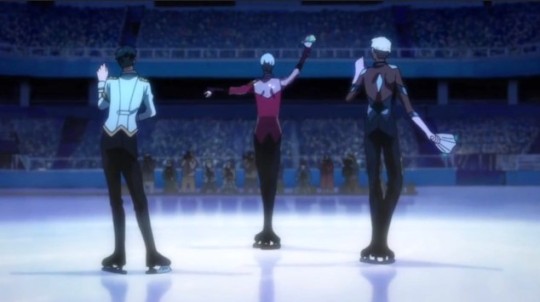
Could it be that Viktor kept the free skating costume because he met Yuuri in Sochi?
To answer that question, we need to take a look at the parameters of the encounter that made Viktor fall for Yuuri head over heels: Being the closing event of a figure skating competition, the banquet happens on the last day when all programmes are skates, all medals have been awarded, and the gala is done. Yuuri and Viktor met there, wearing suits, not the costumes in which they competed. So if Stammi Vicino existed because of Yuuri, wearing a suit would make more sense to narrate the encounter. Unless Viktor wanted to be super abstract about it.
Some skaters change their programme mid-season because their current programme doesn’t work for some reason. Some switch back to an old programme, while others create an entirely new programme. If Viktor had indeed created Stammi Vicino because of his encounter with Yuuri, he would have needed to postpone his work on the routine until late December because his schedule leaves him one week after the GPF to prepare for Russian Nationals—just enough time to pitch the idea to his composer.
A top skater like Viktor could absolutely pull off practising a new free programme in the month between Russian Nationals and Europeans and winning with it. There are a couple of skaters who are reckless enough to do that like Stéphane Lambiel who switched his free programme right before Worlds 2005 and won. Surprising the audience with a new programme mid-season would sound like something Viktor would do—with a new costume.
However, Yuuri started practising Stammi Vicino when his disastrous skate at Nationals ended his season and not one month later (Japanese Nationals and Russian Nationals take place at the same time). And while this isn’t a completely unlikely scenario if one doesn’t take his words of starting right after Nationals literally, it still contradicts the plot and would leave Yuuri less time to produce a perfect copy while studying for his graduation.
To sum this up…
Whereas fan theories deserve to be awarded for their creativity, the likeliest explanation is always the one that aligns best with the facts. There is no valid reason for a figure skater to change their free programme mid-season and keep the costume, even more so if that skater is a notorious perfectionist like Viktor Nikiforov who loves to surprise the audience. The fact that Viktor wore the purple costume in Sochi already can be taken as proof that Stammi Vicino has been his programme all season long. If Viktor changed his programme because of Yuuri, it would have needed to be addressed within the story in some way, even as subtle as giving him a different costume.
There’s an inherent beauty in Viktor having created Stammi Vicino before he met Yuuri because it gives him an agenda beyond his love interest. Well-crafted characters exist outside of their interactions and relationships with the rest of the cast. Viktor had a life, albeit a lonely one, before Yuuri and his (secret) longing for love was an inherent part of it. Especially in a show that is limited to 12 episodes and in which every image is filled with meaning, every little detail needs to be fitted into the narration just perfectly for solid storytelling.
If you enjoyed this analysis, please consider checking out my works on AO3 (link in bio)!
#yuri on ice#yuri on ice meta#yoi#yoi meta#my yoi meta#viktor nikiforov#katsuki yuuri#figure skating#anime#stammi vicino#character analysis#plot analysis#cat's yoi meta
163 notes
·
View notes
Text
Ok, so! Besides the usual, “Of course Newt made it to the safe haven, what are you talking about?? What's page 250???” jokes, I've also seen a couple of posts recently by people who were annoyed that we literally refuse to accept this man's death. And so I throw my opinion into the void. Yes, I love fix-it fics and AUs where Newt lives. In fact, they're all canon to me. But! From an analytical standpoint, I bring this controversial (??) opinion:
Newt had to catch the Flare. He had to die.
In this slightly long and largely unedited essay, I will explain why…
Newt not being immune, besides adding emotional turmoil and intense pain to the story, also added humanity to the Flare, the disease that robs people of their humanity. The Cranks could be perceived as soulless monsters, obstacles, plot development and nothing more. We know that they theoretically used to be humans, and we feel pity for them on some level, but it’s not the focus of our attention. Newt changes that, because Newt is a Crank, and Newt is a human, and we love Newt. I’m aware that other characters were infected before Newt was (in the book all of the Gladers thought that they were infected and in the movie Winston and Brenda actually were), but I feel like Newt being such an important character and getting the virus really brought this point home.
The entire series revolves around the choice between two evils: let the world fall to disease, or torture children for a theoretical cure. Newt experienced both sides of the issues (fell to the disease AND was also tortured for research before that, the poor guy). He understood the need for a cure better than anyone, but he also knew exactly what WICKED would do to get it. And guess what? Torturing children is never ethical!
Newt couldn't live, because then it would just be Thomas and friends vs. the inferior losers with the Flare. Newt didn’t deserve to die, but his friends didn’t exactly deserve for him to live (though they didn’t deserve to lose him, either). The world is unfair, and they couldn’t win everything. This, again, shows the complexity of the issue, challenging Thomas's decision to leave the city and give up on the idea of a cure.
Another issue brought up by Newt's catching the Flare and his subsequent death is this continuous motif of memory and identity, which obviously played a huge role in the rest of the series as well (everyone losing their memories before the maze, writing their names on the wall, remembering all of their friends that died). Newt has always been selfless and caring, and this continues even as he begins to lose his sanity and himself. Newt wants to hang on to who he is rather than turning into a monster, and, ultimately, he chooses death over losing himself. He lives on in memory, though, as well as through his journal. There are so many other complexities to Newt's story; questions of identity, depression, selflessness, bottled emotions, and love. All of this immensely complicates his death, and the fact that it was technically suicide. It's so important to have characters like Newt in fiction, if only to explore the depths of these issues. So many of us can see so much of ourselves in Newt. His story might not give us all the answers, but it does give us a reason to hope.
The truth is that life is unfair. Newt's situation emphasizes how true this is in the story, humanizing the Flare virus and drawing a direct comparison between wicked's goal and the goal of the kids who are running from them. Our world today is similarly unfair, though obviously in different ways. There are challenges and setbacks and hurt, just like in the story, but Newt proves that these troubles aren't all that there is. We can't escape every problem, but we can make the most of what we do have. We can love and joke and laugh with others, even if the world is falling apart. The ending might be sad, but the pages in the middle can still make us smile, and maybe help us inspire the next person to do the same.
#guys you dont understand#maze runner is ruining my life#its consuming my brain like the flare#i cannot focus on anything else#it's becoming a problem#i love my sad dystopian men so much#anyway#tmr newt#tmr fandom#tmr#the maze runner#maze runner#maze runner movies#maze runner books#book analysis#movie analysis#character analysis#plot analysis#all the analysis cuz i don't know how to tag#bro idk anymore
25 notes
·
View notes
Text
Theo Raeken’s original mission in Beacon Hills, given to him by the Dread Doctors, had nothing to do with killing Scott, and was actually about getting Malia to kill her mother instead. In this essay I will-
#canon this canon that#I really don’t care#it makes no sense for the dread doctors to want Scott dead#it makes even less sense for them to ‘allow’ theo to gain his own pack#this has been bothering me for literal YEARS#like why tf was tracy the one to break the mountain ash barrier at the mccall house#they could have it be a random extra#but it was tracy#I just-#AGGGHHHHHHH#anyways#teen wolf#theo raeken#tracy stewart#malia tate#scott mccall#the desert wolf#plot analysis#analysis of subpar quality writing#but I love it regardless#theo-centric
49 notes
·
View notes
Text
Episode Parallels - Arcane S1 & S2
I am positive someone else noticed this but I was all excited because rhyming narratives please my brain.
SPOILERS.
.
.
.
.
Did anyone else notice how Act 1 of Season 1 and Act 2 of Season 2 parallel each other? How Vi has a semblance of a family in both, and at the end of each, that is ripped away?
And then how Episode 4 of both seasons, Vi isn't in the episode literally at all? Like each time her family is torn from her, she has to take ages to get her head on straight--how everyone else keeps moving, but for Vi, it's like she's in a standstill?
And then the parallels diverge, because in S1, Powder / Jinx was the reason Vi left--and Caitlyn rescued her. And then S2, Caitlyn is the reason Vi left--and Jinx rescues her.
And then there's Vander, creating a circle of a narrative by exiting in S1 and returning in S2, right when Vi needed him most.
I love plot analysis, and this was just... so beautifully well done.
#arcane#tumblr fyp#fypシ#arcane s2#arcane season 2 spoilers#vi x caitlyn#vi#caitlyn kiramman#vander#jinx#plot analysis
28 notes
·
View notes
Text
With the way the author is starting to give more realistic and depressing backstories (which has been happening for a while tbf ...see naruhaya) I'm praying to fucking god that Sae's life in Spain was either just mildly taxing or never gets revealed. Like I want it to stay a mystery forever why he came back such an asshole LMAO he just hates soccer in Japan that much 😭
Sae vs Rin gets so much funnier when you think of it as them just being diehard fans of opposing sports teams...
118 notes
·
View notes
Text
Richard deserves his own post, I think.

They could have dressed him up as anything for this Halloween snapshot but they chose a dead guy with sunken eyes. Betelgeuse could have serenaded Lydia with any of the hundreds of great love ballads yet he chose not just one, but two songs sung by men named Richard.
Richard embodies the characteristics of both of Lydia's absentee parents. His death mirrors Charles' in its humorous and chaotic nature yet isn't framed that way within the plot. Charles' was a complete joke but Richard's is taken very seriously. He could have died any number of ways, but he died a watery aquatic predator death. In a film about death, it's too big of a coincidence.
As well, he was gone from Lydia's life long before he died, much like her mother. That his body was never found also forced us to briefly question whether or not he even was dead, just like we have with Lydia's mom for the past thirty years.
He serves no obvious purpose in the plot but to heal Astrid's trauma, and let's be real. The audience doesn't care about Astrid's trauma. We care about Lydia's. The argument could be made that he exists to mend the rift between Astrid and Lydia, but we don't need him for that. Jeremy accomplishes that all on his own.
Following the dreamverse, if we look at Astrid as a Lydia-proxy and Richard as a creation of Betelgeuse's, a "gift" of sorts, he suddenly makes all the sense in the world. Betelgeuse abandons Lydia in the afterlife (an inexplicably out-of-character choice outside of this context considering his three decades of pining) solely to allow her this healing reconciliation with Richard, the joint personification of her neglectful parents.
Richard saves Lydia (and more significantly, Astrid) because her real father never did.
Her real father sold her to Betelgeuse for a handful of snakes.
#beetlejuice#lydia deetz#tim burton#Beetlejuice Beetlejuice#richard#dreamverse#dream theory#fan theory#plot analysis#bjbj#bj2#spoilers
80 notes
·
View notes
Text
Steel, Scrying, and the Presumption of Death: “Who Knows What” and “Who Knows When”
From the desk of TheBardBullseye
Editor's Note 3/17/25: I originally privated this post on 3/6/25 bc I was concerned about spreading potential spoilers even with the lengthy disclaimer below, but then I couldn't share it with ppl who just wanted to read it. So I've turned off reblogs. Carry on/enjoy :)
TL;DR: Alright, I think I’ve unraveled some secrets and put some pieces together. I have to talk about Steel as of episode 43 of The Wizard, The Witch, and The Wild One, “Speak With Animals.” But first, I have to talk about scrying. And how absolutely crucial it is to consider the compartmentalization of information: “who knows what” and “who knows when.” And further, “who says what” and “who says when.” Episode spoilers abound; major plot-relevant speculation and theorizing afoot. Do not read this essay if you do not want to read about potential future reveals about Steel (if I am correct in my speculating and theorizing). I have done my level best to be fair, balanced, accurate with citations, and not misconstrue information in my analysis (except where it is explicitly noted as pure speculation). And here’s my caveat that this essay is a crunchy analysis of transcripts and mechanics, and I fully acknowledge that this story is written with improv and dice rolls: things can change, be walked back, or recontextualized in the future for any number of reasons. Strap in, this is a very long essay (over 11,000 words with footnotes, please read those too!).
An extremely critical note before you read this essay: First, thank you very much for reading! 😊 I welcome any and all constructive comments, and please point out anything that I might have not considered. I thought long and hard about posting this argumentative essay publicly after I finished it, even though I put a lot of time and effort into researching, writing and editing it. This is a very, very long essay, and please take time to read it carefully (if you decide to read it). I feel like I put a lot of pieces together that could be revealed in the near or distant future (depending on how the rest of Arc 4 goes), and this will be a fun time capsule for me to revisit in the future. If I am correct, I do not want to spoil this for people who don’t want to be spoiled, and I hope the warning in the above TL;DR combined with the length of this essay will hopefully scare those folks away. As such, please take care if/when you discuss my theory with others publicly who have not read this essay, so as to not potentially spoil others if I am correct (i.e., if this breaches the containment of this essay in the comments/reblogs/and other online discussions—there’s a lot of nuances in here that will get lost if watered down, and I stress that none of this is yet confirmed and you should not take this as gospel). You have been warned; this is not to be self-aggrandizing; I am just Too Aware that you can't un-ring this bell. Further, if I am right, I don’t want to spoil Brennan’s plans to reveal things about Steel at a later point, but all of this information was gleaned and cited directly from the transcripts and episodes that have been publicly released and contextualized within the rules of D&D. He doesn’t strike me as a ‘Game of Thrones (HBO)’ kind of storyteller to throw away a narrative that has been built up just because someone on the internet (maybe) figured it out before it could be fully revealed. And if I’m wrong about Steel, then I just had a lot of fun with some red string and a corkboard. And that’s what makes this podcast so damn good—there’s so many strings. 🧡
You can support and listen to Worlds Beyond Number at: www.patreon.com/worldsbeyondnumber and can use the transcripts to check my work on the fan wiki: https://worldsbeyondnumber.miraheze.org/wiki/The_Wizard,_the_Witch,_and_the_Wild_One_episodes (these are available on the public patreon feed as well, but the wiki is easier to navigate imo).
If you don’t want to be spoiled but want to read a different essay I wrote about this show, you should check out my literary essay praising Just the Recap at the beginning of Episode 10, “Of the Reaching Green.” (FYI this does have spoilers for all of Arc 1, but not speculative)
I also recently posted an arrangement I wrote of The Rain Road and Auld Lang Syne, if you want to give that a listen: https://youtu.be/Z2Hv6p70r7s
Twenty-two Scry spells. Twenty-two failed Scry spells. How many times do you try the same thing before giving up hope? But it turns out that hope is not lost. Then why haven’t you said anything?
I started writing and outlining this essay several months ago when episode 33 of The Wizard, The Witch, and The Wild One aired, but it has been sitting buried and unfinished because of life stuff until now—it took the earthquake that was “Speak With Animals” to unearth it. In “The Witness,” Suvi cast Identify on herself to see if there was any magic affecting her because of her inexplicable shenanigans with the music box. In this scene, she discovers a lot of magical information about herself, notably (for the immediate moment) the modify memory and the Geas, that we the audience (and Aabria) already knew about. But there was one monumental reveal reminiscent of “Barbarian Healing” (see footnote 1, warning for D20 spoilers) to me: there are many failed scrying spells cast on her from the Citadel, four aimed at her father’s Ring of Aerith that she uses to pull and store spells and “two and twenty” (i.e., 22) aimed at her heart; the former set of spells as old as yesterday, the latter from months ago before she arrived in Port Talon, and, why didn’t someone follow up on that? Suvi learns that her necklace with the flawless sapphire pendant stops scrying from not only Great Spirits like Orima, but also the Citadel and was crafted by Wren, Stone, and Galt (see footnote 2). This, combined with the modify memory and Geas (and everything else up to ep 33), is cause for concern and kicks off Suvi’s questioning of the institution of her home. But there’s a more concerning and an important difference to unpack about the two sets of scrying orbiting her ring and heart: what is the question being asked by the Citadel?
Identify and Scry: Who Are You and Where Are You?
The four scrying spells around her father’s ring are mentioned first in the Identify spell and are about a day old. This is because Suvi had cast magic without the reflexive indicative (i.e. a shortened, quicker way of casting using a ‘null clef’ that removes the self from the casting of the spell, at least as I understand it) and had pulled the spell slot from the Aerith (the big communal pool of wizard juice) the previous day. Thus, it follows that the Citadel would have scried to see who was casting these spells, and (pure speculation) perhaps this kind of alert system is automatically triggered (i.e., by a high-level Tamori?), or maybe it was cast by a higher-level (at least ninth) diviner in Kabani. (I’m sure that this will come back at some point and certainly not cause any problems for Suvi…) This is a red flag, a blip on the radar, asking “Who are you?”, and the Citadel gets no reply.
The 22-odd spells from months ago are much, much bigger red flags, the question being: “Where is Suvi?”, and the Citadel gets no reply. To complicate things further, nobody ever mentioned to Suvi once she made contact that the scrying had failed. You would think it would be a Big Fucking Problem that the (first-level-at-the-time) Apprentice to the Archmage Silence is unable to be scried upon or located, especially with so many failed attempts and discovering that in fact she was Alive. Further, it is alarmingly pointed out to her that someone at the Citadel should have mentioned the failed scrying or followed up, but as of episode 43, no one has. I’ll get to the meat and mechanics of this in a moment, but let’s back up a bit.
Checking the Transcripts
Now, this is episode 33. Suvi first met Galani and had the mirror conversation with Steel in episode nine. More than a year of IRL time between episodes (and about two-ish months in-game). My gut reaction was, “Wait, really? Did no one really mention scrying or even just in passing, ‘we looked for you magically and nothing came up’? Hmm. That was so long ago. I’ve done a couple Arc 1 relistens and it doesn’t sound familiar, and I vaguely recall it being a little odd that they had presumed her dead at the time, but it was hand-waved as ‘we’re at war, probably some evil guy got her.’” I checked the transcripts: Nope. No mention of scrying nor an allusion that the Citadel even tried (and failed). Interestingly, the only time “dead” appears in the transcript is when Suvi asks “they all think I’m dead?” Odd. The only word Galani and Steel use to describe her is “alive.” Did they not presume her to be dead?
Looking back on episode nine now, Suvi’s first conversation with Galani is immediately recontextualized. She expresses surprise that Suvi is alive, noting that “[w]ord went out through the Citadel's private channels to begin searching for you about a week and a half ago,” to which Suvi references her broken speaking mirror and replies with indignation that being in the backwoods of Akham couldn’t contact the Citadel until now (“…they all think I’m dead? [Yelling] How little do you all think of me?!” p.19). Galani justifies that with the reason that there’s a war going on and their enemies kill high level wizards all the time, not that they think little of her in particular. Going no-contact for weeks resulted in Steel assuming the worst (due to the tears streaking down her face), and one would assume the Citadel at-large would too, if they knew. Galani then casts dispel magic and arcane sight, to make sure Suvi isn’t under the influence of any nefarious magic, presumably coming up all-clear. In the moment, it makes sense why failed scrying attempts might not be mentioned by Galani: if Suvi was compromised, then it would not be strategic to reveal that in public (or to her).
Then, in Suvi’s conversation with Steel, scrying doesn’t come up directly in her chewing-out (see footnote 3). It might have been alluded to, “and how CLOUDED do you think my eyes are, here in the Citadel?” (p. 43). At first glance, I think the obvious meaning is, “how oblivious do you think I am?” In hindsight, using “clouded” and “eyes” as hyperbole is very evocative of a Scry spell, but I don’t think it’s the first thing that comes to mind or a definitive mention of scrying, and certainly not from Suvi’s perspective (of one being castigated). Steel is justifiably angry and mostly appeals to Suvi to empathize and put herself in Steel’s shoes in this moment (“Do you think it might have been difficult for me? Sending you back to Silbury? Do you think there might have been anything challenging for me, about wondering what might have happened to you on that island? Do you think that there is any part of me, that might have been worried or concerned?” p. 43). Now, for the beginning of this conversation, Steel was not alone on her side of the mirror, so it’s likely she wouldn’t have wanted to bring up the failed scrying since she would see her in person in a few days (and it was not necessarily the most urgent thing to discuss). I’ll get to the flow chart options of “what Steel knows” and the implications later on, but for right now, put a pin in the now glaring omission from Steel anywhere in this conversation, especially when it is just them: she doesn’t say, “Suvi! Thank god you’re alive! How are you alive? I tried to look for you but it never worked! I thought you were dead or captured or worse! Why didn’t the scrying work? I tried so many times.”
So there’s some narrative reasons why scrying wouldn’t be explicitly mentioned, and I’ll expand on the implications of that later, but this story is not told just by four people yammering into microphones with wonderous sound design, it’s a game of D&D. I know WBN can and does edit out dice rolls and filler for narrative purpose (and it’s one of the many, many things I love about this show). So it’s possible a saving throw for Scry was edited out (I am reminded of the ominous “give me a wisdom saving throw” from Neverafter) or that it wasn’t even asked for in the first place, presuming Brennan has known from the beginning the properties of the amulet. In terms of D&D mechanics, the math really ain’t mathin’ here.
Mechanics, Math, and Motivations
To start, how does Scry work in D&D? It’s a 5th level divination spell, can only be cast on a creature on the same plane (e.g., it does not work on dead people), and the target makes a wisdom saving throw (against your spell save DC and modified based on your connection and knowledge to them). If the target succeeds, they are unaffected, and you can’t cast it on them again for 24 hours. (There are other details about how it works, but this is all that is relevant in this particular scenario, since it will never succeed.) It is very important to note that wizards only unlock the fifth level spell at level 9, so only high-level wizards in the Citadel would be casting it. You also need verbal, somatic, and material components just to cast the spell: “a focus worth at least 1,000 GP, such as a crystal ball, a silver mirror, or a font filled with holy water” (Player's Handbook). (This quite possibly explains the four Scry spells on Suvi’s Ring of Aerith: in episode 18, the Aerith depository in the Tower of the Glove is described as, “a massive…emerald gemstone set into a brass basin within the wall… [i]t stands just inside the doorway, almost like a receptacle of holy water… in the shape of… a bird bath or some other kind of basin.”).
Thus, it is easier to cast Scry on someone you know well and have the closest physical connection to, and even if it fails the first time, you get to try again the next day. For the hypothetical number crunching, I am going to assume that Steel was the one casting Scry every time, because of anyone at the Citadel, she would be the one most likely to succeed (or make it so that Suvi is more likely to fail the saving throw). We also know Steel travels with a mirror, presumably silver. This. Has. Plot. Implications. Because of her knowledge (familiar), Suvi subtracts 5 from the roll. Steel would also have the highest connection (like a lock of hair) for -10 to the roll, or at the very least second highest connection (possession or garment) for -4 to the roll at a minimum. At level one, Suvi’s wisdom saving throw modifier is a +5 (very impressive). Added together, at worst she has a -10 or at best a -4 to the twenty-sided die roll. Already the chances of a successful Scry is looking pretty good.
What is the spell save dc for Steel casting Scry? To calculate this for a wizard, the formula is 8 + proficiency + INT. Unfortunately, I have to make more assumptions than I would prefer to answer this question because we don’t know what level Steel is or what her intelligence modifier is. So, basically all of the variables are unknown. Great. For the purpose of math (because the values do standardize somewhat over a range of levels), I’m going to make a couple of educated guesses, based on Steel’s age, rank, and station.
I think it’s safe to assume that Steel is at least between levels 13 and 16; she’s the highest-ranking non-arch-war-mage, is the Sword of the Citadel, and is probably in her late 40s/early 50s given the age of her biological daughter Cadilla (and Suvi is 21). This would give her a proficiency bonus of +5 and two fifth level spell slots. You can definitely make the case that she is a higher level than 16, but this would only increase the difficulty of the roll, and I want to make fair and reasonable assumptions given the missing information. Steel is also a wizard (she may have a second class, but this doesn’t really affect the numbers), so she probably has a very high INT score to be able to cast magic. At this point in leveling up, let’s say she has at least between 16 and 20 INT, so she adds a +3 at the lowest, +5 at the highest. Again, it could be higher but trying to keep it fair.
I would be remiss not to mention that Steel would hate to know that she is in a D&D game and that I am using made up numbers to infer anything about her. As such, she obviously would not think about Scry in terms of these specific die rolls and ability modifiers, instead she understands that Scry only works a certain percentage of the time when you cast it, especially when cast on people who may have a naturally high wisdom modifier and/or have magical means to avoid it. But she also likely recognizes that Suvi is her daughter and a young un-namecloaked wizard (and would know her full name, Suvirin Kedberiket) and should be fairly easy to successfully scry upon. She could maybe scry on Ame (since she knew Suvi was going to see her), but she would probably know that she wouldn’t have nearly enough connection to her (i.e., enough to subtract from the roll), might realize Ame has high WIS, and on top of that, Steel is also actively involved in war and may not want to use that spell slot. At level 13-16, she has two fifth level spells, and would already be using one of them to scry on Suvi. (NB: You can cast Scry on a location you’ve visited before, like Grandmother Wren’s cottage, but they left soon after Suvi’s speaking mirror broke, and it’s likely the cottage has wards against that anyway.)
Steel’s spell save DC (8+ proficiency + INT modifier) would be anywhere from a 16 to 18 DC for Scry. Subtracting either 10 or 4 from the roll overall, Suvi would have to roll a natural 20 for Scry to fail (in the best-case scenario, i.e. lowest modifier and lowest DC, if she rolled a 19, the save would be a 15 and would fail). The probability of Suvi passing the wisdom saving throws for a single Scry is 5% (1/20). It should almost always work, unless something is interfering. As Steel casts it again and again, the chance of it not working approach zero. The probability of Suvi passing TWENTY-TWO wisdom saving throws, consecutively over as many days, or rolling 22 natural 20s in a row is 2.384186e-29. That’s a lot of zeros following the decimal point. If Suvi has advantage on the roll, the odds improve ever so slightly, but not enough for this to be credulous. (Above the table, we also know that Aabria’s dice were rebelling against her, especially in the first arc!)
How would one mechanically avoid Scry if you don’t have a one-of-a-kind magical amulet blocking it that the caster may or may not know the properties of?
There are a couple of ways. The most accessible spell to counter it is a third-level Nondetection, which explicitly blocks scrying and divination but only lasts 8 hours (and Suvi doesn’t have access to it and won’t for a while). An even more powerful spell is the eighth-level spell Mind Blank, which grants immunity to divinatory spells for 24 hours. There’s an edge-case where Grandmother Wren cast Nondetection or Mind Blank as a precaution when Suvi first arrived, for some unknowable reason, but Wren was also gravely ill (see footnote 4).
But for this to be the case over twenty-two castings, then someone close to Suvi (as the range for both is Touch), would have to be continually casting either one 3rd level spell every 8 hours, or burning one 8th level spell slot per day. This is not a logical conclusion—what insane circumstances would have had to arise to warrant burning those magical resources?
Occam’s razor says that the simplest explanation is probably the correct one. As each Scry fails, it becomes more and more likely that the creature is dead or not on the same plane: the primary conditions for the spell to succeed.
One final thing to consider about avoiding scry with a magical item in D&D. We know that the Citadel and Empire keep records of magical items (e.g., Suvi logged the items taken from the Azure Battalion in episode 8), and Suvi’s amulet has a powerful abjuration on it, above anything that would be standard issue. Steel, at the very least, would know what items had been issued to her by the Citadel (like her staff). Suvi is very protective of her amulet and has stated multiple times throughout the show that she keeps it hidden and has not mentioned it to anyone.
The Compartmentalization of Information: Who knows what and who knows when?
Following that summer at Grandmother Wren’s, it is established that Suvi has not left the Citadel in the intervening time. There would be no need to scry on her when she is there for obvious reasons (and we know they did not because there were no older spells mentioned in the Identify). When she teleports to Silbury, this is when the Citadel would have first discovered that they could not scry on her. They try again, and again, and again, to no avail, and after 22 attempts, start search efforts. Now here’s something you may have noticed: I’ve been using Steel and the Citadel somewhat interchangeably, and that’s on purpose. The Scry spells described in the Identify are marked as from the Citadel, not a specific person, which (purely speculating) may have to do with the reflexive indicative, or a similar identifying/obfuscating component of the lingua arcana, marking and masking the individual user as being a member of the Citadel. I think there is a case to be made that someone other than (or in addition to) Steel cast Scry, but I do think Steel cast the first one, at the very least. I will elaborate on this, but let’s break down the information available to Steel:
Steel now knows the following when Suvi turns up alive at the Chantry in episode 9:
Suvi is not dead or on another plane,
Because of Galani’s abjuration checks, she is not under the effects of any spell and is who she says she is,
Grandmother Wren is dead (i.e., someone who could’ve repeatedly cast Mind Blank or Nondetection),
She was not traveling with a high-level caster who could have cast either of those spells,
There is not a standard issue magical item given to Suvi by the Citadel to prevent scrying,
And the 22 scrying spells failed not for any of those reasons.
We now know, of course, that Suvi’s necklace blocks scrying from the Citadel and Great Spirits. So, this raises several crucial questions, especially if you haven’t been relistening or combing through transcripts (like I have):
Q1) Does Steel know about the necklace?
Q2) Does she know what the necklace can do?
Q3) Why didn’t anyone mention the failed scrying?
Q4) Does the Citadel proper or anyone else at the Citadel know about Suvi’s necklace or the failed scrying?
Let’s go down the line and examine each possible answer.
Question 1: Does Steel know about the necklace?
Yes. Stone told Suvi not to show the necklace to anyone, and she has not, to her knowledge, done so on purpose, except for one time: when Suvi showed it to Steel when she picked her up from Grandmother Wren’s cottage at the end of the Children’s Adventure. And although she didn’t outright say “my mom gave this to me,” it is heavily implied. When Steel gave her Soft’s ring, Suvi showed Steel the amulet, and put the ring on the same chain. So, Steel absolutely knows that this necklace exists and inferred that it was from her mother given the context and significance of the moment. But Suvi herself did not know any of the properties of the necklace when she showed it to Steel and wouldn’t find out until the end of Arc 1 (great spirits) and in the moment of the Identify casting (the Citadel).
Question 2: Does Steel know what the necklace can do?
Before I can answer this directly, I need to revisit those assumptions from the earlier Scry calculations.
Question 2a: Who cast Scry twenty-two times on Suvi?
I keep repeating myself, but 22 is a really large and specific number of castings for such a high-level spell, and it borders on excessive. Obsessive, even. Wizards don’t unlock their fifth level spell slot until level 9, so whoever was doing this is definitely high(er) ranking at the Citadel. Let’s start from the framework outlined earlier, that Steel cast all twenty-two Scry spells. This means that while at war, for twenty-two days straight, she burned a 5th level spell slot (of which she has two) to cast Scry. This is not trivial. Consider the sequence of events and headspace that Steel would be in that would lead to her casting it this many times.
To me, the first Scry reads as a mother’s worry, “Oh I’ll just check on her, make sure she got to Wren’s OK.” Check the speaking mirror, no answer, “I can cast Scry, so no need to bother Kabani with this.” It fails. “Ok, well if she’s with Grandmother Wren, then maybe Wren took precautions, no big deal, I’ll try again tomorrow or in a few days.” Second Scry fails. Even more concerning. Fails a third time. The speaking mirror still isn’t working, so Suvi can’t even be ordered to submit to the spell. Scry again. And on and on and on. At what point does she divulge this information to anyone, to the diviners in Kabani, or to Silence? Suvi is her daughter, an extremely valuable and high-ranking member of the Citadel, and now she is a ghost on the wind. Steel let her go, Steel gave her the staff, Steel went out on a limb and let her leave the Citadel for the first time since she returned from Grandmother Wren’s. And the only plausible reason it fails twenty-two times is if she is dead or on another plane, or a very-high level magic user is casting magic to prevent it (for good or evil is moot), and let’s first presume that she does not know that Suvi has a one-of-a-kind magic item to specifically prevent Citadel scrying. Regardless of her duty as Sword of the Citadel to report the loss of an asset, does she? Let’s assume she doesn’t know about the necklace and doesn’t report the failed scrying to anyone. What are the implications of this, and is there circumstantial evidence to support this idea?
After twenty-two Scries (cast by only Steel), we know from Galani that a private order goes out to begin searching for Suvi, and Galani makes no mention of whether that order included anything about her presumed status (that field of the BOLO could have been left intentionally blank). But the timeline is a little fuzzy, so it’s possible that twenty-two days had elapsed before the order went out, which was a week and a half before Suvi showed up in Port Talon. Let’s say that a week and a half is 10 days, for a total of 32 days, or just over a month since Suvi left the Citadel/ Grandmother Wren died. I think, if Suvi had been gone for over a month, Galani and Steel would say, “Suvi you’ve been gone for over a month,” not “weeks.” But they don’t, because she hasn’t been gone that long.
Galani: “What have you—so you've been traveling around Akham for a week and a half? Two weeks? For a long time.” Steel: “I am glad you are alive. Now, the last time we spoke, I said "No rush in getting back to me. Take your time." Because I was sending you to see Grandmother Wren, who I had heard was deathly ill. So I said, "Oh, I want to give her a day, or two, to settle in." It's been weeks, Suvi. It's been weeks.”
So, given the timeline, Steel is likely not the only one to be casting scry. Let’s divide twenty-two into a couple parts to see what fits the timeline:
If two people cast Scry on Suvi per day (maybe at alternating intervals to catch her unawares, to catch a missed Nondetection or some other reason), then that is 11 days of casting, plus ten days of searching, for 21 days (three weeks) since Suvi left the Citadel. That seems plausible, and for the best odds of success, the other person casting it would probably be Sonder. If this is the case, Steel may have cast the first Scry, and in a normal conversation with Sonder about their surrogate daughter and her first solo adventure, mentions the failed Scry and asks for a second opinion.
If three people cast Scry on Suvi per day, then that is 7 days of casting, plus 1 for the first failed casting by Steel, plus 10 days of searching, for 18 days (two and a half weeks). Building off of that, then the three wizards would probably Steel, Sonder, and a closely trusted diviner in Kabani (who may have other means of boosting the chances of a successful Scry). This could be Scholar, who was the diviner that Steel visited to ask about Ame’s prophecy about the coven (episode 18, Steel: “I talked to Scholar. I talked to the Wizard Scholar, she's been—she was very clear.”). This is also highly plausible given the timeline. Any larger number of people casting Scry is possible but not plausible given the restriction of information, the timeline, and the resources needed (e.g., the ability to sacrifice a 5th level spell slot on a failed attempt).
Now, I reiterate that if we presume that Steel does not know the properties of the necklace, then the reasons for Scry to fail so many times spell disaster for Steel and the Citadel (i.e., death, abjuration of the Scry by a high-level caster, or a magic item they don’t know about). And, the compartmentalization of the information that Suvi cannot be scried upon is extremely important and sensitive: if the Citadel’s enemies or others wishing to kneecap the next Archmage of the Citadel found out not only that she is missing, but also cannot be magically located, then that is a Big Fucking Problem.
And word of Suvi’s disappearance did go out, but only through private channels, and it is notable that Galani was the one who showed up at the Chantry (rather than literally any other wizard). Galani must be at least level five, since she could cast two third level spells (or maybe she has some souped-up Citadel magic items to allow multiple slots of that level as an abjurer, anything’s possible), and she is characterized as “the Head of the Des Moines Agricultural Bureau” to Suvi’s “intern at the White House.” It is revealing that Galani is trusted with that information, not just because of her level and rank, but it shows that she was the most trusted person nearest to Akham/Port Talon, and that she knew (or at least knew of) Suvi when training at the Citadel. Basically someone (Steel) went, “who do we have on the ground, preferably an abjurer, in Akham that can be trusted not to divulge that the Archmage Apprentice is missing and can get to Port Talon to check out this rumor quickly? Also, who would Suvi know and feel safe reaching out to?” That Suvi was missing (or even had left the Citadel) probably wasn’t disclosed to many others, given that Akham is on the fringes of the Empire’s influence. Even more importantly, Galani claims she only knew to look for her in Port Talon because Morrow blabbed to anyone who would listen. Steel then made a beeline for Port Talon by air from wherever she was on the war front, since teleporting to Silbury would be even slower. So, considering all of this information from episodes 9 and 33:
Back to Question 2: Does Steel know that the necklace prevents Scrying by the Citadel?
Based on the above evidence, I can conclude that no, she does not, if she presumed her to be dead (see footnote 5). If she did, then why attempt to scry in the first place if she knew it would fail every time? Why attempt to scry another twenty-one times? If you argue that she does know the properties of the necklace, then Steel is either the biggest idiot on the planet to waste a fifth level spell during wartime (and possibly repeatedly) or the most conniving manipulator, which is so blatantly disrespectful to her character and relationship with Suvi (what, she scried knowing that it would fail so that she could drop everything to go yell at Suvi? And manipulate her into doing what exactly? And to guilt trip Suvi into feeling bad that Steel thought she was dead? To what end?). Besides, we’ve already met a wizard who has shown themselves to be one of the most conniving manipulators: Keen.
Question 3: Why didn’t anyone mention the failed scrying?
This is the question that prompted this entire essay, and I’ve been slowly teasing it out. Once again, it boils down to “who knows what” and “who knows when.” I am very confident that at most, three people at the Citadel know that the scrying failed as of episode 9: Steel, Sonder, and Scholar. The compartmentalization of that information is likely very high, so it’s possible that more people may know or have figured this out by episode 43, but we can’t know for sure. However, there’s even more context needed to answer why none of those three mentioned it to Suvi.
Q4: Does the Citadel proper or anyone else at the Citadel know about Suvi’s necklace or the failed scrying?
Given the reasons outlined above, no, apart from anyone who may have assisted Steel with scrying in the intervening weeks (i.e., Sonder or Scholar). All of the scrying spells aimed at her heart are two months old, from the time between the speaking mirror breaking and “when [Suvi] was on foot, with Ame, in Akham” (ep 33). No other pending scries, no other wizards attempting to scry on her before or after that time period. I suppose, it’s possible that they expire after a year or something, but I highly doubt that anyone tried or had any reason to, since she had essentially lived at the Citadel her whole life apart from that summer. We know for certain that once the search for Suvi began, no one from the Citadel attempted to scry on her again. Finally, given the mechanics of Scry, it is clear that there are not random unnamed wizards going, “Hmm, I wonder what the Archmage Apprentice is up to right now” and actually casting Scry.
The only other thing I’ll briefly mention here is that Sly was also seen in Suvi’s Identify (he fits the description to the letter). Sly appears to be able to divine things about her: he refused to give Suvi bad news, knew that she was key to success at the coven meeting, and knew that if Eursulon didn’t get a shield, both Ame and Suvi would die within the year. There’s an important difference here that scrying looks at someone in the present time. On a successful Scry, the following happens (from PHB):
“On a failed save, the spell creates an invisible sensor within 10 feet of the target. You can see and hear through the sensor as if you were there. The sensor moves with the target, remaining within 10 feet of it for the duration. A creature that can see invisible objects sees the sensor as a luminous orb about the size of your fist.”
Since Sly specializes in catastrophic futures and prophecy, he likely wouldn’t be attempting to Scry on her in the present-day. I can’t say for certain whether he would know about the necklace or its properties or not, for other divinatory reasons.
However, Identify was 10 episodes ago, and a Citadel wizard could have attempted to scry on her in the intervening time. I cannot say for certain whether this has happened or not (e.g., during the rescue mission or after Suvi left Bracken with those two failed luck checks, though I’m sure the literal and metaphorical fog of war doesn’t help), but this neatly brings us to Eioghorain.
Scrying, Eioghorain, and the Presumption of Death
Okay, I’m far enough into this essay that I’ll let anyone reading this know: if you were expecting me to speculate about Steel’s involvement or responsibility (or lack thereof) in Soft and Stone’s deaths, you’re out of luck. Instead, I must talk about her behavior thus far regarding Eioghorain, because he is a HUGE wrinkle in all of this scrying business (see footnote 6). So far, I have assumed that Steel does not know the properties of the necklace, and as I have outlined, it is logical to conclude that by using “Who knows what” and “Who knows when.” However, I have mostly been using evidence from episodes 33 and 9 so far, and we still have the unanswered question of why Steel hasn’t mentioned the failed scrying yet. With all of this information, we must now consider what was revealed about Eioghorain in episode 16 (“Everything”), when Steel finally has a conversation with Suvi about him. (see footnote 7)
In episode 43, Suvi asserts that Eioghorain killed her parents, and that Steel was the one that told her that on the day that she picked her up from the cottage:
Suvi: “The last time I saw you, they sent me away, you went off to do whatever you do, and then a six-year-old girl was picked up by Steel, and told that her parents died at your hands. And I’ve been waiting to see you ever since.” Eioghorain: “If I had, we would settle it here and now… I betrayed your parents, but I didn’t slay them. I don’t know how they died.” Eioghorain: “Steel told you, point blank, that I killed Soft and Stone?” Suvi: “Yyyup.”
Unfortunately, Suvi is partially and meaningfully wrong here about what Steel told her. First, Steel did not mention Eioghorain by name or refer to him or his culpability when she picked Suvi up from the cottage, only that her parents died as heroes. Eioghorain is briefly mentioned by description in episode 2 and doesn’t get mentioned again until the very end of episode 14 (although I could be wrong). In a flashback, Suvi finally has her conversation with Steel on the balcony of the Tower of the Sword in episode 16, “Everything”:
Steel: “It is my belief that Eioghorain is responsible for the death of your parents…” [Steel explains why she thinks that, and the circumstances of Soft and Stone’s final mission. Further, she admits that she doesn’t have definitive proof, except that she claims she wasn’t there and Eioghorain was. Until recently, she thought Eioghorain was dead, which is why she thinks he was responsible in some way.]
It’s possible Suvi is misremembering given everything that has happened, but strategically, it’s also a more forceful accusation to say, “Steel said you killed my parents and I’ve been waiting to see you since I was a child,” to get a reaction and answers from Eioghorain, than to say “Steel said you were responsible and she only told me this a month ago.” Further, I believe that it matters less what Steel said about Eioghorain’s culpability; because while discussing Eioghorain, Steel told Suvi about an instance when scrying failed to work and Steel knew that the reason was NOT because the target was dead:
Suvi: “I’m going to ask the questions now that I think are why you didn’t tell me this story earlier. You think he’s still alive? You haven’t found him? Do you know where he is?” Steel: “I’m telling you this now because I have come to the certainty that I cannot find him… I think that there are means at his disposal to keep him hidden from the Citadel. Obviously, we have tremendous power at our disposal…” [Suvi mentions the diagrams of Eioghorain that she and Ame looked at in Episode 2, that Steel had given Suvi to show to Grandmother Wren] Steel: “Several weeks ago, I made the determination that Eioghorain was still alive, something that I was unsure of up until recently. [Steel asserts that him being alive means that he had to be responsible because he is violent and deranged.] Steel: “The diagram that was going with you to Grandmother Wren was me conceding defeat and asking for help from one of the world’s most powerful witches… If magical power could solve this, then the Citadel could solve this. What we’re dealing with is something outside our sphere of understanding. He has some form of abjuration on him, but we have probed around the edges. We’ve talked to all of the Diviner’s College. We’ve seen everything we can trying to go after him. We’ve found locked doors, which is not the same as finding a wall… So it’s just about who has the key… And Grandmother Wren, when she was still alive, there was a chance that she would tell me it was impossible. In which case, I never would have told you to have you go berserk with something like this hanging over your head.” Steel: “Instead, with her gone, we’re left with an open-ended question. Perhaps a witch could find Eioghorain. Perhaps a spirit could find Eioghorain. Perhaps Soft and Stone gave some ability to you to bypass those locked doors. I don’t know. What I do know is this, and I need you to hear me, Eioghorain would kill you, as you are today.” Suvi: “I hear you.” [Aabria has stated that she meant this as a challenge, or at the very least that Suvi would need to level up a couple times before she should go after him for answers.] Steel: “…So I’m out of options. And there’s elements of this left to explore, that we can explore when Ame is awake again.” [They did not explore this with Steel because of the attack at Fort Kieran and WitchCon.]
Um, what the fuck. Before I pulled up this transcript to check the facts about what Steel said about Eioghorain, I did not recall this many specifics about Steel’s attempts to find Eioghorain, only that she thought he was dead and realized he wasn’t. I completely forgot that Steel mentioned scrying (while the spell was not explicitly mentioned, the evidence that she tried to scry is plain as day) to Suvi’s face, IMMEDIATELY FOLLOWING the events in Port Talon and Suvi’s return to the Citadel. Not only that, we now know that the EXACT CIRCUMSTANCES of the failed scrying on Eioghorain and presumption of death were the EXACT SAME for Suvi, and though we now know that it failed for Suvi because of the amulet, we don’t know what made it fail on Eioghorain (other than he also has a powerful abjuration on him).
Further, something changed Steel’s mind about Eioghorain being dead BEFORE Suvi left the Citadel to see Grandmother Wren.
Until I looked back at Episode 16, I thought I had put most of the pieces together, and had an answer for this open-ended question:
Why hasn’t Steel mentioned to Suvi about the failed scrying attempts on her? She’s had so many opportunities to say something, but it hasn’t been the right place, the right time, or the right amount of information.
It is really strange that Steel talks about scrying and abjuration in episode 16, with (presumably, as I’ve argued) full knowledge that she had scried on Suvi several times, but Steel explicitly wants to wait to talk about abjuration and scrying until Ame is awake. Why not mention it now? Any number of reasons intersecting with her role as mother and member of the Citadel: she just dropped a bombshell allegation against Eioghorain, she doesn’t want to scare her, she doesn’t want to overwhelm her, she doesn’t want to plant a seed of disillusionment. And if she didn’t make the leap in logic that the reason Suvi couldn’t be scried on was the necklace, we know that Steel, by her own admission as with Eioghorain, would not want to divulge that she only had part of the picture to anyone else until she was desperate or exhausted all options.
Following episode 16, several relevant things and conversations occur. Shortly after Ame wakes up, she and Eursulon essentially flee the Citadel before any conversation with Steel can happen about Eioghorain. Then in episode 23, Suvi has another conversation with Steel about divining, concerning the prophecy (Steel: “We just always have to—we just all have to always be saying what we know.”—I don’t know if she recognizes the hypocrisy here). Scholar, a diviner in Kabani, is name-dropped. Steel appeals to Suvi about “wizards are known by their secrets,” then immediately bites her cheek until it bleeds, and Suvi insights Steel, gleaning what Steel thinks: about how diviners can be tricked or be wrong, and how there are “all these edge cases and marginalia” (to be clear, Steel does not say that, Suvi learns this on an insight check). Gee, I wonder what Steel was thinking about in that moment. No mention of Suvi’s failed scrying. They talk about Sly, among other things. Then Suvi is off to WitchCon, with a Geas and a Modify Memory in tow. No time to explain anything. WitchCon is not fun for anyone. Suvi casts Identify on herself. Shit hits the fan: fleeing the Conclave, rescuing Silver, getting through Hallicker Forest. The next time Suvi talks to Steel is in Bracken in episode 41, but that’s neither the time nor the place to reveal that. Steel will be there in a couple days, so just stay put, and we’ll have that frank conversation. But the cracks in the justification machine are widening, and so Suvi heads to Twelve Brooks, gets half-arrested by the Empire for abandoning her post (Silver, you RAT), and then is abducted by Eioghorain. And then these pieces fall into place.
Now, like Steel, I am left with so many more open-ended questions, but instead of asking them, I will lay out the timeline and facts regarding Eioghorain, Suvi and Steel.
A Timeline to Remember (What We Know and What Can Reasonably Be Inferred)
Since Soft and Stone were killed, Steel has been unable to find Eioghorain, by scrying or other means. Steel and all of the diviners in Kabani presumed him to be dead because they could not scry on him. Stone’s necklace protects Suvi from scrying by the Citadel and Great Spirits. Prior to the events of Episode 1, Suvi has lived at the Citadel her whole life and the only other place she had ever been to was Silbury (where she got the necklace) and Toma, where she was under the protection of Grandmother Wren. It is very likely that no one at the Citadel attempted to Scry on Suvi before she left the Citadel for the first time since that summer. Several weeks before Suvi went to visit Grandmother Wren, Steel changed her mind about Eioghorain being dead. Steel sent Suvi to see Grandmother Wren and show her the scroll case and book. Suvi did not have time to show these to her. After Grandmother Wren died (and the interaction with the Man in Black), Suvi’s speaking mirror broke, and Steel discovered that she could not scry on Suvi and that she is alive. In Episode 16, Steel does not mention that to her, but does mention that scrying does not work on Eioghorain and he is alive, and does not explain how she knows this.
Logical Conclusions and Mechanics
Mechanically, in order to scry, you need Knowledge (Secondhand, Firsthand, or Familiar) and Connection (Likeness or picture, Possession or Garment, Body Part or the like). It will always fail if the target is dead, but if you have imperfect information (i.e. not adding the highest modifiers to the roll), then concluding the target is dead could be false. What components did the Citadel have in order to attempt to cast Scry on Eioghorain? His Likeness: which is a 150-year-old document depicting a garran, a similar creature to the one Eioghorain shapeshifts into (giving a -2 modifier) and some variance of Knowledge: Citadel diviners would give +5 (secondhand if they never met him, unless it was cast by a diviner who was a member of the Acadator, who would have a higher bonus) and Steel would give -5 (familiar). At worst, the modifier is +3 and at best, it is -7. We know that Eioghorain succeeded on every single save. As outlined, it would be reasonable to presume that he was dead, but this is not conclusive.
In the weeks leading up to Grandmother Wren’s death, something changed Steel’s mind about Eioghorain’s presumption of death. Logically, the thing that would have changed Steel’s mind would be a change in the components available, and mechanically, the modifier. What would give you definitive proof of death? A body part or the like, not just his likeness. Thus, we can conclude that until this point, the Citadel did not have a body part or the like to cast Scry with.
Moreover, if Steel casts Scry with a body part or the like on a dead person she knows well, the spell AUTOMATICALLY fails because it cannot target them. So, what happens when you cast Scry on a PRESUMED dead person you know well with a body part or the like? It doesn’t AUTOMATICALLY fail: something else happens (per Steel, “we have probed around the edges… we’ve found locked doors, which is not the same as finding a wall.”). This is a false negative or type II error in reasoning, where something is declared false when it is actually true.
What body part or the like of Eioghorain’s was just discovered?
In episode 18, “Between the Lines,” Suvi, Eursulon, and Ame investigate the scroll that the Citadel was using for scrying on Eioghorain, though they do not explicitly glean that this could be its purpose, but they get close. The document is 150 years old, depicting a garran, and there is a NEW smell that has been added to it, and Ame can discern that it was added recently. Eursulon figures out that it is biological in nature, with the scent of blood and bile, mixed with the scent of iron, which taken together doesn’t smell exactly like a garran, but it is similar to it. It makes sense to conclude that in sending that document with Suvi to show Grandmother Wren, Steel wanted her to check her work and confirm that Eioghorain was unable to be scried on and alive (and Suvi posits this as well in the episode, “maybe Steel replicated his smell so Grandmother Wren would know him specifically?”), and to see if there was a way around the powerful abjuration (a “key”).
Missing Pieces and Limitations
Editor’s note: I cut an entire section of this essay right here and changed the above heading, because it was quickly and dangerously veering into off-topic speculation about the connection between the curse and the smell. There is too much to unpack and too little definitive information about either at the moment, and I realized that any theories I might have now shouldn’t be included in this essay that is fundamentally about Steel and Scrying. However, the fact that Eioghorain has the same smell as the contingency expectorant of Ame’s curse is going to be very important, and there’s certainly another full essay I could write using the “who knows what and when” framing when we have some more information.
With all of that said, there’s definitely Steel-involved interactions that I have omitted from this essay: basically any other interactions in other episodes not mentioned here or other parts of her conversations that I did not include for relevancy’s sake. I also did not discuss the other characters’ (Suvi, Ame, Eursulon, etc.) perspectives or views of Steel, such as how trustworthy she is, what they believe her values to be, or her relationships to them. This is because of the framing of this essay, which is to look at what Steel knows and when she knows it (and why she doesn’t disclose it). In admitting this, I leave open the possibility that I may be cherry-picking evidence or reading way too much into this. I’ve tried to be as balanced and thorough as possible in my analysis, and I think my logic and conclusions are sound. I also want to acknowledge how insanely good Brennan is at burying plot details in plain sight and inconspicuously in an improvised medium, and now he has free reign to do this in a long-form campaign (see footnote 1). We’re only 43 episodes in and the characters are only level four; there’s so much more to come, including the rest of Arc 4, which has been teased as, “a series of the *wildest* sessions [they’ve] ever played” (per Brennan’s Instagram). I don’t think I’m ready for that, but I’m beyond excited to see what happens next.
Discussion
On that note, if I am correctly reading between the lines of Steel’s conversation in episode 16 and understand that the mechanics of Scry on both Eioghorain and Suvi failed due to some kind of powerful abjuration (whether or not these abjurations are related), then my earlier conclusion that Steel definitively does not know about the properties of Suvi’s amulet (that it can protect from Citadel scrying) is almost certainly false, presuming Steel has put all of these pieces together (by episode 16). To throw fuel on the fire, Steel definitely knows about the abjuration on Suvi protecting her from Great Spirits, though she may not know these are related. In episode 12, “Prisoner’s Dilemma,” Suvi tells Steel that Orima could not hear her but does not know why (this is before Suvi figures it out on her own with Orima, and as far as I know this interaction regarding Orima has not come up between them since).
The reason Steel knows about the properties of the necklace (beyond what Suvi has told her) is that she would have come away with the same answer about Suvi that she did with Eioghorain, especially if she maxed out the Scry modifier and cast it enough times to be certain that the probability of failure without magical interference was zero. Remember, neither Steel nor Galani said outright that they presumed her to be dead, just that they were glad she was alive. Why didn’t they presume her to be dead or mention that presumption? Galani may well have presumed Suvi dead when she first received the search orders, but upon hearing rumors that Suvi was in Port Talon (before confirming she was alive), she may have concluded that Suvi was under the control of powerful magic or had means of obscuring her location from the Citadel. However, to rub salt in the wound, for Galani, just like Silver, questioning orders like that is above her paygrade. (Editing-Bullseye remembered something important about the presumption of death, although it doesn't really change the conclusions that Steel would have drawn. Word may have reached the Citadel or the Empire she was alive when the party tried to charter a boat in episode 3 using the Citadel's name with Captain Karkoth. This might change the math of who was casting Scry, but I don't think there is enough evidence to support that right now. Worryingly, Captain Karkoth was headed to Carrow, where the Glass Coronet is. There are SO many factors at play; it's insane!).
Steel would not have presumed Suvi dead when she issued the search orders because she had magical evidence that contradicted that assertion, and thus would have known that Suvi was alive but missing, because she couldn’t scry on her. Since Suvi was not dead, when scrying was attempted, Steel did not hit a wall, and instead found a locked door. As outlined earlier, she knows that Stone gave Suvi the necklace, and Stone was an abjurer. Only a powerful abjuration would manifest like this on a failed Scry. (Steel, episode 16, “Perhaps Soft and Stone gave some ability to you to bypass those locked doors. I don’t know.”) So, she quietly issued search orders to contain that information. Further, this may be why Suvi’s namecloaking was expedited, not just to get around the court martial when Suvi threatened the Azure Battalion, but also to stop anyone from probing into the time period when she went missing. Thus, the focus of the Citadel and the Empire at-large shifts from how Suvi ended up in Port Talon to thanking her for minimizing the casualties and being honored with a namecloak. I may be reading too much into this, honestly, and also find myself obfuscated by this compartmentalization of information: “who knows what” and “who knows when,” especially when crucial pieces of the picture are left out.
I started writing this essay as a deep dive into Steel’s psyche to figure out why the scrying still hasn’t come up yet. She is Suvi’s adoptive mother and so far, has not turned out to be the mustache-twirling evil villain that some claim her to be (with little to no supporting evidence). Withholding this knowledge from Suvi is not damning of her character, but it is fascinating, given the number of opportunities to divulge it. Steel is characterized as being methodical, rational, intelligent, and tactical, but she is human (obviously), and displays genuine emotions: care, anger, laughter, sadness, joy, pride, disappointment, concern, etc. (Steel, ep. 14, “I just hope everybody’s thinking carefully.”). She was a member of the Acadator and a true friend of Stone. Part of me thinks that she wouldn’t keep this hidden from Suvi unless she had a very good and logical reason, but she is human (and played by one), and even very intelligent humans do dumb things for not very good and illogical reasons. Especially given the conversation with Suvi in episode 23 about ‘wizards being known by their secrets’ and then very obviously holding something back (biting her cheek until it bleeds), there is part of her that wants to be forthcoming and not keep this secret. In her mind, it just hasn’t been the right place, the right time, or the right amount of information to be able to share what she knows (Steel, ep 23, “When you have all the information, that's when you can make the right decision.”) Unfortunately, I don’t think there was or will be a “right” time or place, or if there was, she may have already missed it, since Suvi has essentially found out for herself with the Identify spell. What could be the reason to not say something? I think it is that Steel is missing or hiding an additional important piece of information, and she is protecting Suvi by not telling her and by compartmentalizing “who else knows what” at the Citadel, especially from its leadership.
This is my absolute pure speculation about what that might information be related to. Consider the Acadator’s discovery: that the League of Whispers was both sanctioned by the Citadel and believed to be warping its mission. Suvi, the daughter of two former Acadator members, and surrogate daughter to another, is now on the leadership track of the Citadel. Soft and Stone were remembered as heroes. Why and how do you think Suvi got to her position as Apprentice Archmage at such a young age, apart from her own innate talents and hard work? I think this could connect to why Steel has not said anything to Suvi about the scrying, but this is purely speculative and I cannot know for certain. Again, her reason to withhold this could be very good or very bad or very ignorant.
Finally, I must stress that the nature of The Wizard, The Witch, and The Wild One being an actual play show means that it is difficult to point to the specific wording a character uses and read between the lines and go, “this is canon and will never change or be retconned,” but in order to do any kind of analysis like this, you have to assume that, and also assume that the storytellers are paying as much attention as you are. There’s a through-line in several episodes regarding Steel and Scrying that has too much evidence, both plot-wise and mechanically to be dismissed outright as of episode 43. The thing about WWW is that these seeds can be planted now and grow in the long and short term, and we’ll just have to wait and see what crops up when. We also may never know, depending on the choices the players make and the direction the story takes. For now, I have written over 11,000 words about this with supporting evidence, and I understand a lot more about Steel, except that I’m left with no definitive answers to the question:
“Why haven’t you said anything?”
Concluding Thoughts and Asking Questions
The audience for this essay is me: I wanted to explore what makes Steel tick because it is so easy to make a snap judgment and proceed with looking for evidence to confirm, not disprove it. It is a reminder to myself to not jump to conclusions, to think critically, to read charitably first and cynically second, and to look for all sides, but I acknowledge that I am posting this publicly. So, dear reader, I’ll leave you with this advice: the next time you feel the urge to post anything divisive or reactionary about this show (…or really anything), take a second (or more) and stop and think about the whole picture. Relisten, look at the transcripts, take care, and pay back the respect to your intelligence the story is showing you. If things don’t make sense or don’t line up, take note of it, and know when to start and stop speculating. Assume the best before assuming the worst. Maybe that rumination will spawn something like this, because you need to fill the gaps and the space yourself with supporting evidence and not with implication or vibes (albeit maybe not with this many words). And honestly, I find that a more fun and fulfilling way to engage with this show (see footnote 8).
Footnotes:
1) Spoilers for Fantasy High Junior Year: “Barbarian Healing,” the five-years-long reveal from Brennan on a natural 20 investigation from Riz, answering the question, “How did Ragh get that curse? How did Ragh actually become able to see Kalina?”, and plays a clip from Sophomore Year, that Porter had put the curse on Ragh through “barbarian healing” and immediately after, was able to see Kalina for the first time. Barbarians can’t heal mechanically, but a multi-classed barbarian can. As the barbarian teacher, Porter was assumed to be just a barbarian. And Brennan reveals a lot more plot-relevant information and setup/payoff that I won’t spoil here. All I’ll say is that Brennan is really, really good at dropping hints through both story and mechanics, not pointing out the players assumptions about those hints, until the exact right time: then he asks the players a simple question, challenging their assumptions, that contextualizes everything prior. It looks like the exact same thing he did to Aabria/Suvi in episode 33; he just hasn’t fully revealed everything yet.
2) FWIW, Ame/the audience knew that the amulet was crafted by Stone, Wren, and Galt already, but it had not yet been revealed to Suvi at this point because of interpersonal drama (objectively).
3) The first thing Steel asks Suvi is “Where in the firmament, across the wide world of Umora have you been?” Now, I’d like to think that I have a pretty good vocabulary but sometimes you think you know the definition of a word but you look it up and it’s different, like meaningfully different? I thought firmament meant “earth” or “the world” (like terra firma). It doesn’t. It means “the sky” or “the heavens”, and I just think that’s really lovely and evocative of Steel’s relationship with the yet-to-be-namecloaked Wizard Sky (even if it was yelled). Just wanted to shout out Brennan’s adept word choice here.
4) We learn that Wren and Stone worked on the enchantment of the flawless sapphire in the amulet, and that Galt is the one who sourced it (in episode 23). My personal theory mechanically is that this is a version of the wondrous magical item, “amulet of proof against detection and location.” Wren crafted it as a permanent talisman (witch class feature) using the Mind Blank spell, cast either simultaneously or as part of a ritual with Stone using the lingua arcana without the reflexive indicative.
5) This is a shining example of how game mechanics enhance the story being told. In any other medium, you couldn’t use reverse-engineered (made-up) numbers to figure out a character’s motivation, perspective, or amount of knowledge. You can analyze what the characters say and do and infer their motivations in any story, but the mechanics of an actual play story (in this case D&D) add a sliding scale of confidence: it’s impossible, it’s 50/50, it’s an absolute certainty (and everything in between). For example, examining mechanically how things (like Scry) work or fail, so that reveals like this aren’t hand-wavy or not set up within the constraints of the game. There’s a codified magic system baked into the game and the story. It further demonstrates how a close examination and interpretation of the rules in the context of a story can lead to very compelling story beats and character motivations. After all, the WBN tag line/motto is, “we play games to make stories out of sound.”
6) This essay is so long already, but I needed this much space to fully flesh out all of the moving parts and what is known (and I likely still didn’t mention everything). I had originally added this footnote (“This essay is long enough”, i.e., I’m almost done) because I was only going to briefly talk about Eioghorain, and then I checked episode 16, and my brain exploded. I have often audibly gasped when listening to the episodes on first listen, but NEVER when reading the transcript!! When I started this essay last year, I was mostly looking at episode 9, since ep 9 was the first time scrying could have come up, and the fact that it didn’t immediately get mentioned was really strange. I didn’t get any farther in my research than that, until I reopened this draft (more of an outline, really) after I listened to ep 43. Had I finished this essay before then, it’s likely I would’ve checked episode 16/other Steel conversations eventually, but the reason I looked up ep 16 was to check exactly what Steel said about Eioghorain, and then I kept reading…
7) This isn’t as relevant to the scrying business, but it is relevant to Steel’s character. I wanted to mention the other part of Eioghorain’s story from ep 43, which involved the situation with the League of Whispers and offers insight into Steel’s motivations and morals. That I can speculate on, since he provided a lot more context (and at the very least, the perfect Nat 20 insight check means that he wholeheartedly believes this information to be true). The compartmentalization of knowledge and of the Citadel itself (through its courts, academic tracks, roles, responsibilities, and its connections to the Empire) makes speculating on how Steel factors into any of these situations a black box, because we just don’t know all of the moving parts. It’s likely that she is not entirely in the dark, given her station, but she’s also not one of the Archmagi, so she likely also doesn’t have the full picture. Her title illuminates her place in this: she is the Sword of the Citadel, she is the one to take action, to do the striking down, perhaps to cut out rot, but at any given moment, what actions she can take rely upon knowledge, time, and space. She’s a really interesting mirror to Suvi’s arc of being able to take action when everything lines up and there is time. This is really demonstrable too, of this story’s underlying moral philosophy: you may know (or think you know) the right thing to do, but will you do it? If you don’t have the knowledge, time, and space, is it even possible to do the right thing? If not, what should you do with what you have? For example, Steel had a plan for how to handle Port Talon: free Naram without destroying the derrick or flooding Port Talon, arresting Morrow and his collaborators, and figuring out who in the Empire sanctioned it. Instead, quest fever happened and she missed her window to enact her plan, so she could only “[write] a letter to the Imperium saying that the Citadel disavows magic this dangerous… handling it fast and dirty got us a letter.” We will never know if Steel’s plan would work, if it was a morally good plan, or if it would have resulted in a better outcome. As we learn from Eioghorain, the Acadator (including Steel) was successful in their mission of exposing the League of Whispers (a suspected cabal in the Citadel doing research that would warp the mission of the Citadel) outside of the chain of command, only to find out that it had been sanctioned by the “leadership of the Citadel” (i.e., the Archmagi).
This is why it is so fraught to assume ANYTHING concrete about Steel’s involvement (or lack thereof) in Soft and Stone’s death right now (i.e., for those of you that heard Eioghorain’s story and went, I knew it! Steel is the Bad Guy!). There is barely any information so far about “Who knows what” and “Who knows when” regarding where, how, and when they died, to draw any sound conclusions on the matter right now. This doesn’t even consider the possibility of memory modification or erasure, given that it has already happened to Suvi, at Steel’s hand. I do think theorizing and coming up with wild speculation about that is really fun and cool and am not saying you shouldn’t do it! There just isn’t a lot of evidence to support it right now because we’re missing almost all of the information about what was happening in the rest of Umora during the Children’s Adventure.
8) Ok, I’ll get off my soap box. I know I am just a tad obsessed with analyzing this show (three lengthy essays and counting), but it is ASTOUNDING to me that just a handful of episodes and a couple pages of dialogue can birth the depth of character analysis like this. This show is a gold mine.
*Final Disclaimer: I wrote and formatted this in MS Word, converted to RTF/HTML, then pasted this into Tumblr and made final edits/formatting to the paper for readability. I pray to Enzo that there no weird formatting or spelling errors (and my apologies if there are, I proofed this so many times). Thanks for understanding!
#THIS ESSAY HAS SPOILERS#worlds beyond number#wbn spoilers#the wizard the witch and the wild one#suvi#essay#steel#my writing#plot analysis#worldsbeyondpod#www spoilers#major spoilers#speculative spoilers#d&d#spoilers#wwwo spoilers#i'm sorry/not sorry this is so long
13 notes
·
View notes
Text
ToA: Hidden Oracle Opinion (4/4)
Should had done this post yesterday but I fell asleep-
Anyway. Since the last 3 post on this were more about my thoughts on the book and some of the scenes in it,I'm going to focus more on the whole concept and the technicalities here.
Let's start with something easy,the narrative choice.
Since we are talking about a serie of books focused on an ex-god,especially one like Apollo that know everything,it's important to have a narrative structure that allows you to let him develop and run real risks. And that the same time,you also can't let the readers know everything already though the MC,so you need to find a solution to left the mystery and plot twist.
For this reason Riordan made sure that Apollo was like an amnesiac person,one second he remember everything and then he forgot. And that's a double-edge sword type of narration choice: for the readers it can get annoying,especially when there are enough pieces to arrive at the solution to the puzzle on your own. We are talking about history too here,so if you know enough about the roman empire and it's emperors you already have a good idea of who is who based on the few hits the characters give you. And at the same time is dangerous for the characters too,since they can't think about anything to save their life. But it was the only way Riordan could have pulled this off,since otherwise Apollo would have already knew everything and there wouldn't be a mystery at all.
Returning to only having the MC in first person telling the story,instead of continuing to alternate PoVs like he did in HoO,was the best choice he made. He is more comfortable in it and it's show in the writing style,that is similar to PJO,that HoO missed. And it's also more smooth to read since we are following only one person,while the people around him live their life. This also gave Riordan a way out in case he doesn't want to explore more of certain characters,and focusing only on the ones that interact with Apollo the most like he did with Percy and the main gang.
I don't really have much to say,for now,about the narrative style since I only read the first book,but it's better and HoO and I hope it's stay on the same waves in the next books and don't fell off.
Now,let's talk about the characters and their interactions/dynamics.
Apollo is stuck,he keeps going back and forth between 2 emotions and that's it. Either he is despairing and feels guilty about everything and doesn't remember shit,or he has a bit of self-esteem and know things that until then he forgot. That's it (at least for the first book,hoping to see him get better in the next one-),there isn't anything else. His major internal conflict is about Daphne,about how guilty he is for what happened,and how much he truly loved her (and Hyacinth). And I don't like that. There are a lot of more things he needs to focus on,and having the ex romance be brought back so many times,just to make Apollo more miserable is not a good way to make him understand that he need to change. He already knew that deep down. It's fine if he feel guilty about it,and I know that their myth is tragic and Apollo is clearly hurt by it,but in almost every chapter there is always something that brought her up. Where are the real problems at? Why aren't we focusing on something more than make him feel guilty for everything without giving him a development??
Meg is Luke,that will pull a Silena (without dying) and Nero is Kronos. Their dynamic is similar as them,but there is a special factor here: the one-sided emotional attachment that Meg has thanks to Nero's gaslighting. That fortunately Luke and Kronos never had (Silena for Luke on the other hand....). Ah,manipulators. They are the worst and really know how to mess you up. But I'll talk more about them in another post.
Meg herself is a child that got so abused that decided to close herself and believe whatever Nero tell her,because it's more easy that than seeing the truth. Because the truth would kill her. So she decided to believe in a lie and live with it,like it was normal. And it's been years since she is with Nero,so he brainwashed her in any possible way. He let her live in the streets,probably happy to get rid of her in the maintime,and call it love. And she accepted it and believe in this "love language" (read:Stockholm syndrome) of his. She was hurt,she is hurt and will continue to hurt untill Apollo get her out of there. She needs help and someone that let her understand that it's safe to get away from Nero,since he is an abuser,and that she doesn't need to be scared to do so. Victims of abuse are hard to convince to break free from the cicle after all,and it's realistic for her to be scared and unsure.
Apollo and Meg dynamic will surely become a found family one,with Apollo helping her realize that Nero is,in fact,her abuser and not a caring father figure,and to get her away from him. And Meg accepting that,and finally finding someone that will actually care for her,and will not have to live on edge every day of her life. Like Percy did with helping Annabeth realize that Luke was becoming someone she didn't knew anymore.
The parallelism between all of them is crazy here. Right now this is the subplot I'm invested most. Psychological damage is real and I live for it.
Austin and Kayla were a delight. This is the first time I saw them since I have no memory of them in PJO (maybe they were too much in the background-),and they are so sweet and chaotic. I liked how Apollo had bonding moments with them,and most of the time it was about things that regarded his domains: Austin with the music and Kayla with archery (and Will with medicine). They are really similar and the way they were caring supporting of him,even tho Apollo himself never cared much about his children in general,really slapped him with the reality of being a bad dad. And the way he wanted to get them back to safety was everything,he is trying and I like that.
What I don't like is the fact that Will got (again) push in the back. Where is their significant moment? The bonding time he and Apollo should have got? Will is part of the demigods that were there when the gods were neglecting them and Kronos was starting to rise again,so I can't image how he was feeling seeing his father mortal in front of him and living with him. There must be some hard feeling here. And then watching him interact with his siblings but not him? He must have felt like shit,but at the same time happy because Austin and Kayla finally could be close to their dad. He didn't.
I already said this,but having Austin and Kayla dissapeare/being kidnapped,while Apollo and Will were both in distress,was the perfect moment to have them interact. Instead of spending the night with Meg waiting,it should have been him and Will. So that Will could finally let everything out and make Apollo realize really how much shit the gods are to them and he needs to change asap. Yes,another moral slap but it's needed here since Apollo is still in his god mentality of "let the demigods do the job for me while I do nothing. They will probably die but they will die with honor." It also make Apollo realize how much neglected he is of Will,even with him here,and how much Will suffered because of the gods treatment towards demigods in general. And make also realize Will himself that Apollo does care for him,and will try to be a better father. It's not a fast change since he was like that forever,it will be slow,but he will change. And Will is going to help him with that.
Ok,I love to much this type of angst that I got carried away,sorry-
Moving on to Nico. You all know what my thoughts on him are,especially with his powers. It's been 6 months in which nothing happened since there weren't prophecy,and he is still in the condition of fainting for everything. Not even in HoO,when he was dying and fading away,he was this weak. And I'm going to be pissed about this for the rest of the serie,because I know there would be other moments like this and then Rick will go:"Sike!" and have him kill someone with just a touch.
It's probably worst than Apollo being stuck in only 2 moods,because one moment he is weak,the other he is destroying someone. Pick up one Riordan,you can't have him alternating between these 2 states. Nico is strong enough to use his powers without problems after 6 months of rest,let him grow out of this stereotype.
It's ok if he want Will to take care of him,but he can do that without nerfing Nico more than he already was. It's triggering.
I liked how the old campers and characters are doing their own things now,and are growing out of CHB mentality. There is a whole world for them,and of course there are still a lot of dangers,but this isnt stopping them from going on sith their life. I like that.
Having the Seven still in the narrative,as supporting characters is also a good thing since they are there,but at the same time they are also doing their own things and can't really help Apollo. Percy coming to save the day wasn't something I liked because Riordan always use him as a solution for everything. A character is in danger and can't do shit? Percy pull in and save the day with some powerplay moves that only he can do. Let him go man,he needs to live his life after everything,you can use someone else for that now. Having Leo and Calypso as his quest-mates was something I wasn't prepared for,since most of the thing I spoilered myself were about the later books and Solangelo. I really thought Nico and Will were going to be with him most of the time and I was totally wrong. Their relationships are also interesting since Leo felt at ease with Apollo while Calypso and Apollo are a bit complicated. Can't wait to see how they will turn out.
I liked how we got introduced to new campers too. Some of them were already there during the other books,but were most of the times background characters,while others are straight up new. They also hav more diversity and rappresentation and I appreciate that,but after all Riordan is know for having a whole lot of different characters in ethnicity and sexual orientations. This also gave him the opportunity to flesh out more new characters instead of using the same one as always,in case he want to of course (we all know how he is).
Python got introduced too early in it. Apollo already knew what was the problem and who he had to fight even before the race. Untill then Python was a concept like Kronos was before actually taking control of Luke's body. The "meeting" in the Labyrinth was uncalled for. It was too soon to introduce the final boss of a 5 book serie,and the focus wasn't even on him,but on Nero and the emperors. If Riordan wanted to have Apollo getting closer to his identity he could have had done something else about it. It wasn't even after the first 100 pages of the first book out of 5. At least he waited to introduce Kronos in the last chapters of TLT.
I feel like Python is Gaia 2.0 here,he will have an occasion to shine at the end of the last book (probably),while the emperors are the Giants. They are the main problem Apollo and the demigods will focus on for the rest of the serie,even tho they are not the final boss. That's ok. I hope that it won't end up like BoO final battles,those were horrible.
Also,idk if it's true since I never interacted much with ToA material,but apparently the whole conflict against the Emperors will end up in a war? I'm not even sure myself,but if we have another war I might cry. These guys had just won 2 in a row,in not even a year of distance,and now there is another one coming? We need more therapists than Mr. D because these children needs help.
Since we are back in the greek part of the Pantheon,the world building is the same as PJO.
I don't have issues with that since I always preferred greek mythology to everything else,and PJO world building was pretty solid and was the base for HoO's world building.
The only problem I had was the Labyrinth. But it's something that unfortunately happens with every writer and story,and not only with objects but also with characters.
When a main character story end,and the author continue to write and still include them even when it's not their story anymore,they become side characters. Which means that the beloved character we had before totally change since the author needs them to step down and let the new protagonist take the stage. They become OOC,weak,disinterested or non-existent at all most of the time too. The author plays a lot on the nostalgia,that even with just a reference to the old story,can give to the readers. So in a few words their change can be described in: loosing plot armor and their importance to the plot.
That's something done a lot in anime,cartoons or movies,but also in books too since they need to focus on the new guy and the old one become irrelevant,if not an obstacle to the new MC.
Of course this isn't the case for Riordan since for him it's the opposite. Even with a new protagonist,Percy is always relevant or will always be more powerful than the new guy. We saw that with Jason and everyone else in HoO.
The same thing is also applied to some object: since you need to introduce something new or more powerful,the old one loose their importance or their values.
An example of this are Hazel's powers. Once Hecate told her about her mist powers she concentrate on those and trained those,instead of her own powers,since now she has a more powerful "upgrade". Which is something I don't like because even without her ability to control the mist,Hazel is extremely powerful and it's also bittersweet how she favored the mist to her own nature. But that's on me.
The Labyrinth has the same problem. It was introduced as one of the most insane place ever for a demigod to be,and then little by little it got reduced to something simple,because the books had other dangerous place to visit.
Chris went insane there and Dyonosus had to help him out of it. Clarisse turned back from her mission and didn't want to get back in it. Other demigods that went in there either got lost or died with Luke's traps or because of the Labyrinth in general. In HoH Percy and Annabeth told Hazel that they couldn't use the Labyrinth to get the statue back at camp,because it's too dangerous and unstable,especially with Pasiphaë remodelling it as she wanted,instead of letting be like Daedalus created it. And now campers are having a race in it,without even weapons or some protections or some plan to get out of it.
The Labyrinth cannot be controlled and that's something we already understood in BotL with Annabeth. And now they are trying to see if they can utilize it,like,have you all forgot what happened almost 3 years ago?? You had a battle inside there and most of you died,and now you want to do something you already know it's impossible??? Where is the logic at??
Austin justification of this is because the Labyrinth changed and it wasn't anymore evil,but it's still dangerous and can get you in very bad situations (i.e.: Apollo at Delphi). It's still change and it's still a bad place for demigods to be since the Emperors are also using it to move faster in various part of the world from what I understood. It's like Kronos's army all over again. And that was just Riordan trying to save himself here,since he knew he couldn't have them being in the Labyrinth without downplaying it's dangers.
It's unfortunately pretty common tho,Riordan isn't the first and won't be the last to apply this type of choice. Once something served its role they lose their value and the author can do whatever they want with it. This it's also extended to everything: characters,objects,powers,locations,and everything else in between.
Anyway.
I liked the Hidden Oracle,and even if there were a couple of things I don't agree with,it was better than HoO and I hope the quality won't die between the books. I don't think I will be able to read the second one since I need to do a lot of things for school,but I'm going to buy it anyway in these days. I'll probably continue my reading after my high school exam tho,so I'll need to wait to finish the story.
This doesn't stop me from analyze the new characters and their trauma backstory tho :)
#percy jackon and the olympians#heroes of olympus#percy jackson and the heroes of olympus#trials of apollo#writing analysis#writing comparison#writing ideas#character analysis#relationship analysis#plot analysis#trauma analysis#nico di angelo#will solace#austin lake#kayla knowles#apollo#meg mccaffrey#camp half blood#the seven pjo#python#the emperors#the labyrinth#world building analysis#narrative#not me ready to analyze everything those books will gave me#watch me#there is so much angst that it's going to fed me for months#rick riordan
20 notes
·
View notes
Text
We don't need Yugi's flashback because their story has been told for a long time. (an analysis) Part 2.
3. Hakubo and Sumire. Mystery and yorishiro continue. How does this relate to Yugi?
Tsukasa is also a sacrifice to the demon hole in exchange for a wish, also a yorishiro in the form of a human. There is a difference in how Sumire was betrayed against her will, while Tsukasa died of his own free will.
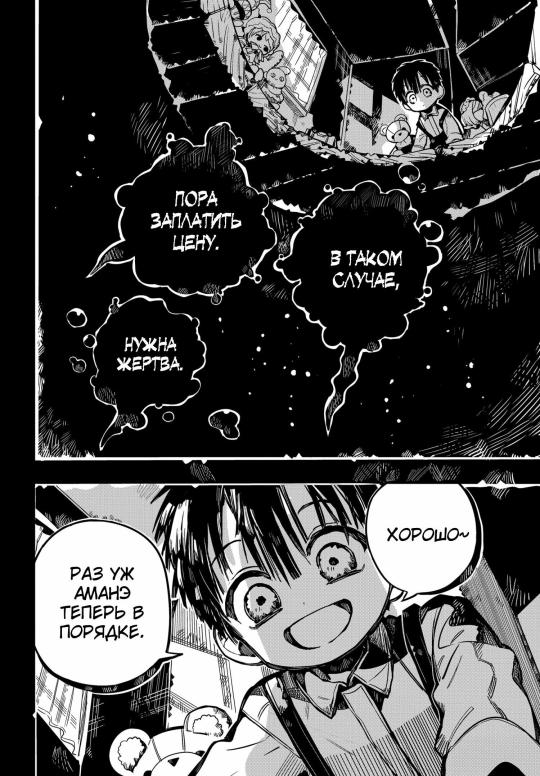
Tsukasa sat alone in Hanako's boundary for a long time, calling for him, but he never came.
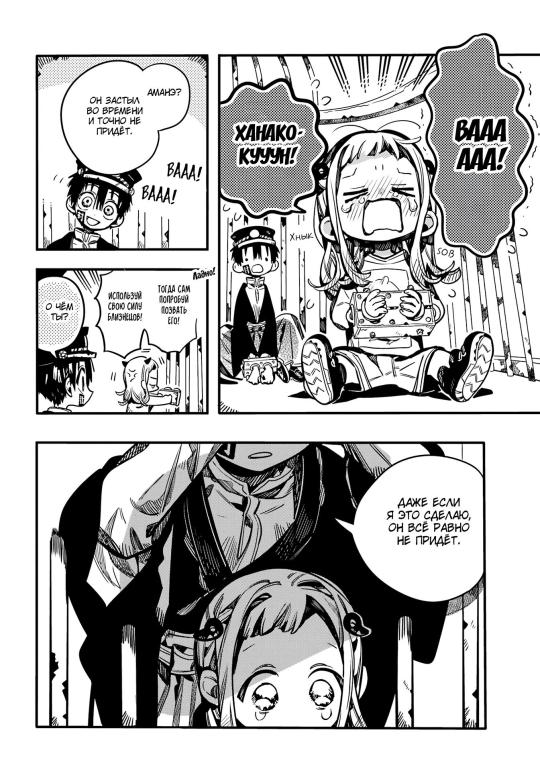
Most likely, Tsukasa has not met Amane since the very day of his death, and when he appears in the chapter with donuts, this is really the first time he was able to go free and enter the plot.
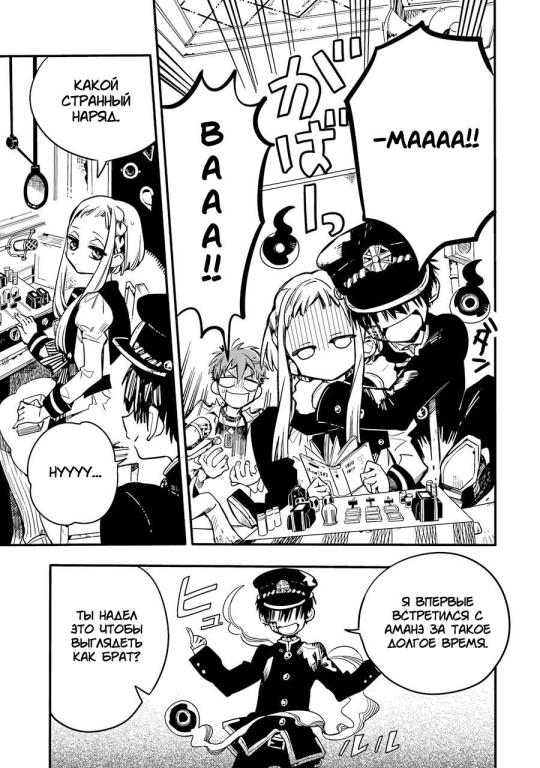
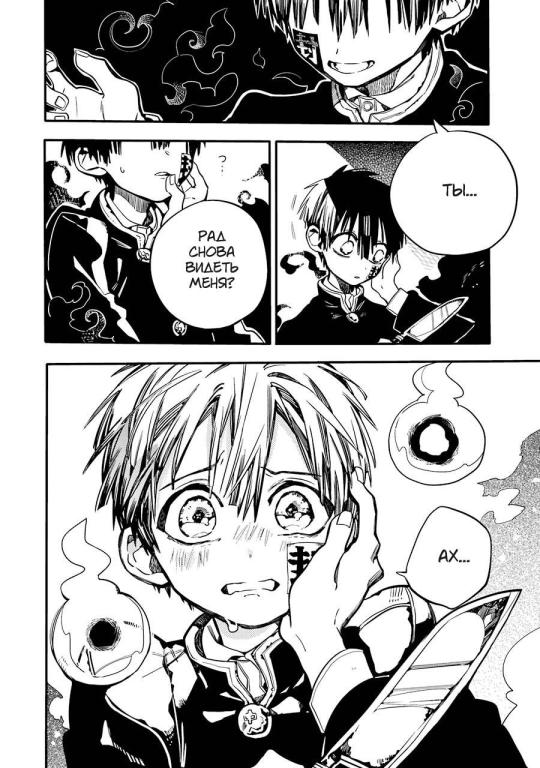
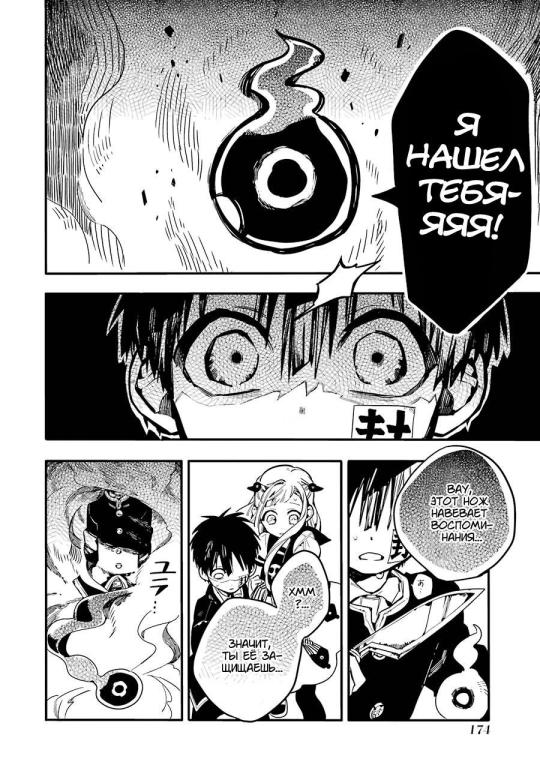
Tsukasa, unlike Sumire, is sure that Amane hates him, and does not consider himself significant to him, he is surprised when Amane begins to cry.
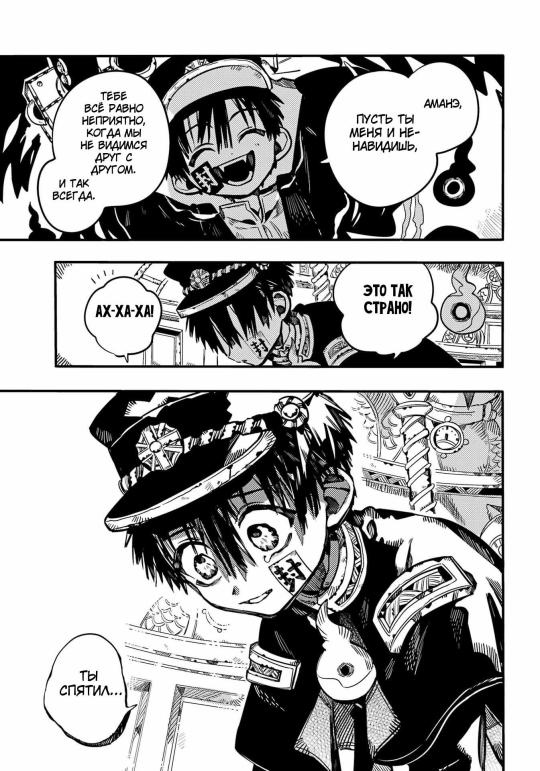
Tsukasa is also tired of his existence, he just has some goals that still keep him afloat, but having achieved them, he is just as ready to disappear if it will help others, close to him.
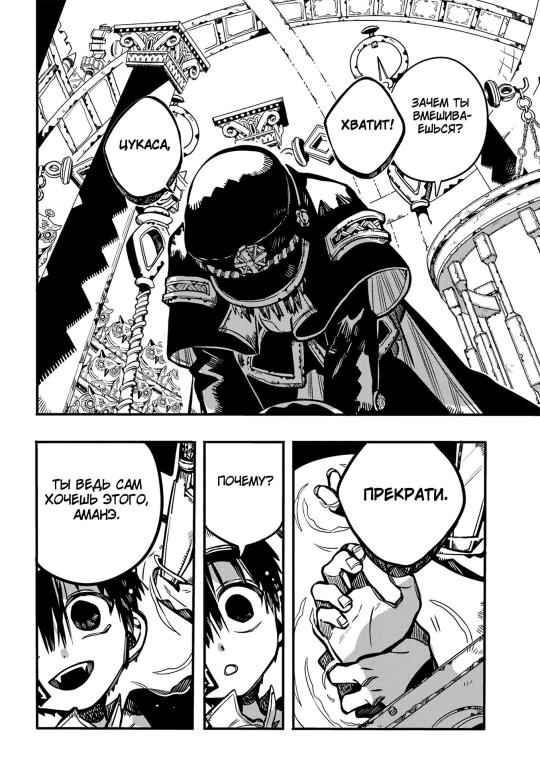
What is so good about Amane, because he is unbearable? Why did Tsukasa and Nene love him so much? Here it is, the irony. Sumire had no options, Nene and Tsukasa still get along with people easier
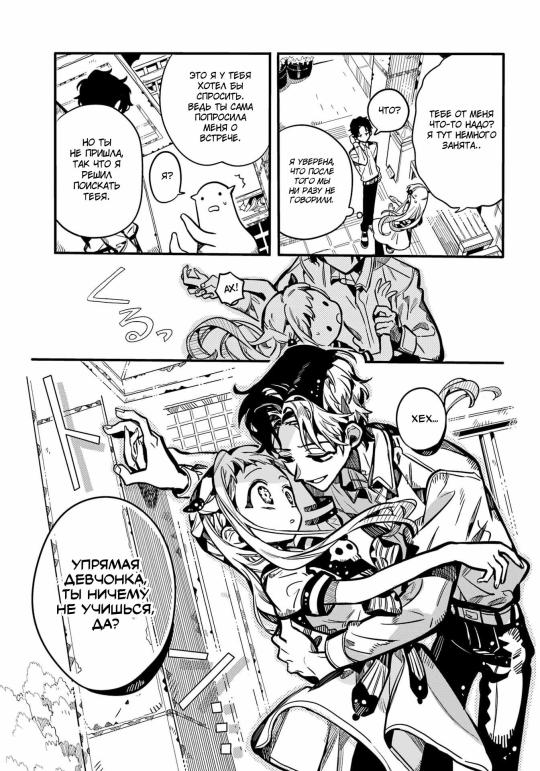
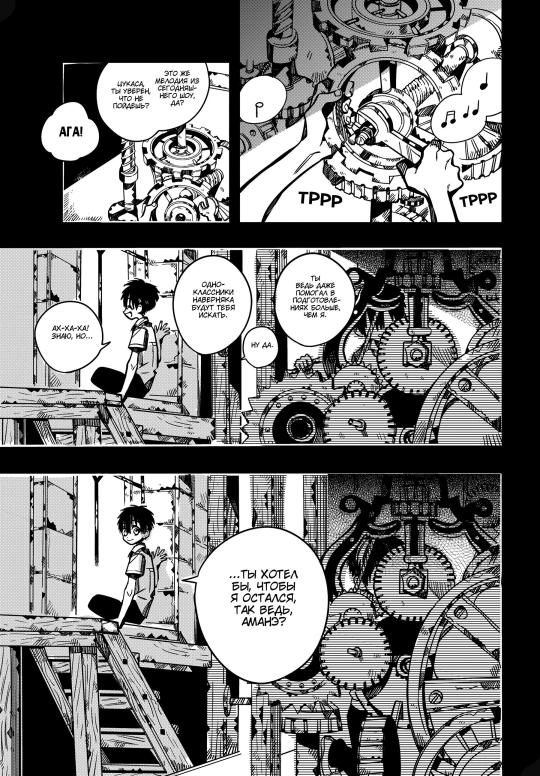
and nevertheless, love is blind.
Tsukasa is very unrestrained, and probably because he finally got out of prison and can control his and even other people's actions. Tsukasa does not ask to be remembered, but deep down he also wants at least some recognition of his value. Amane also suffers that he acted this way towards Tsukasa, he blames himself a lot, but at the same time also shifts part of the blame to his brother.
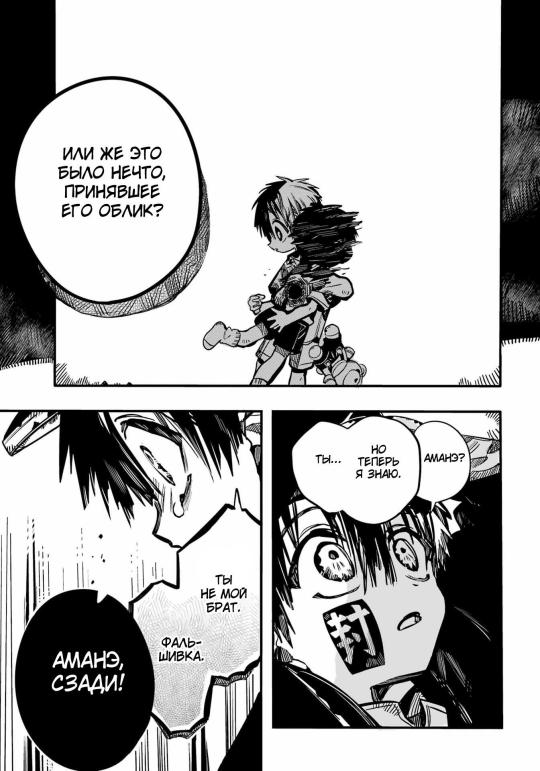
After all, it is his fault that he is fake, if everything were different, if Amane had lived a different life, he would not have done this. He, just like Hakubo, did not value the time he spent with his brother, and now he is stewing in his own guilt, while leaving Tsukasa alone in the locked boundary and not answering his call.
4. Aoi and Akane. Close since childhood.
These two were close like twins, growing up together since childhood. Aoi was a shy girl, while Akane was more easily approached by people, and as a result, she remained in his shadow.
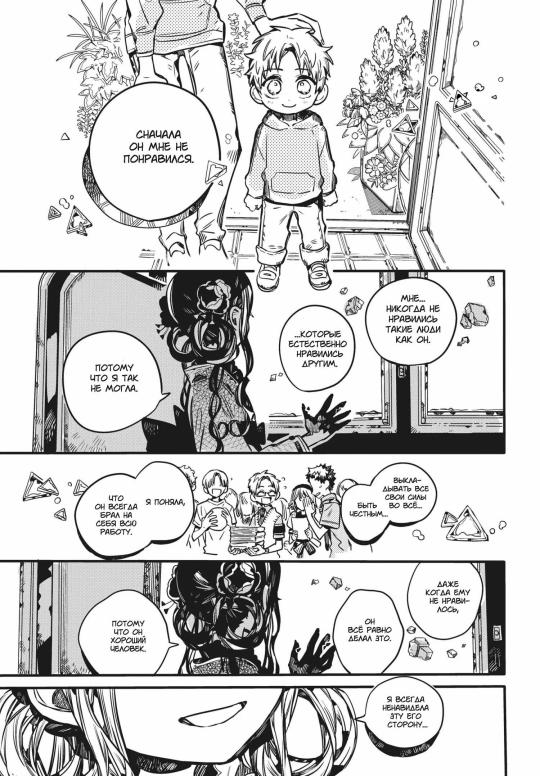
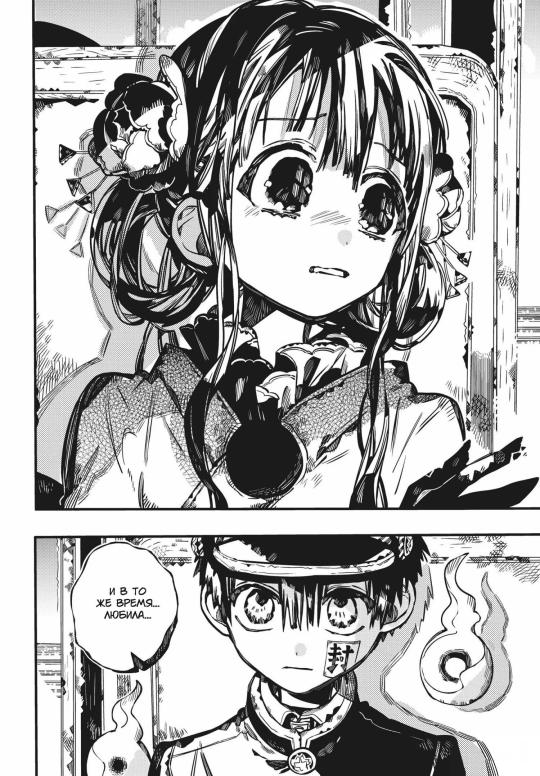
At first, they grew up like normal children, and both acted completely normal, until one fateful day came...
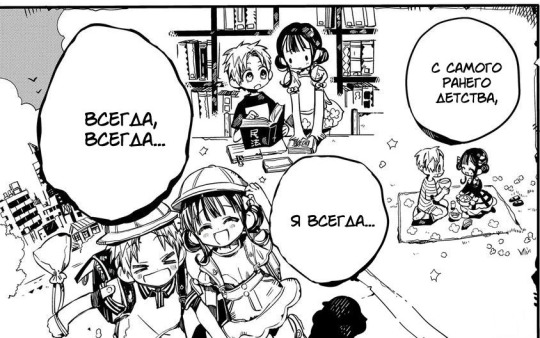
The Clock Keepers recruited Akane by threatening to kill Aoi, and thus, he made a contract with them, becoming half-supernatural.
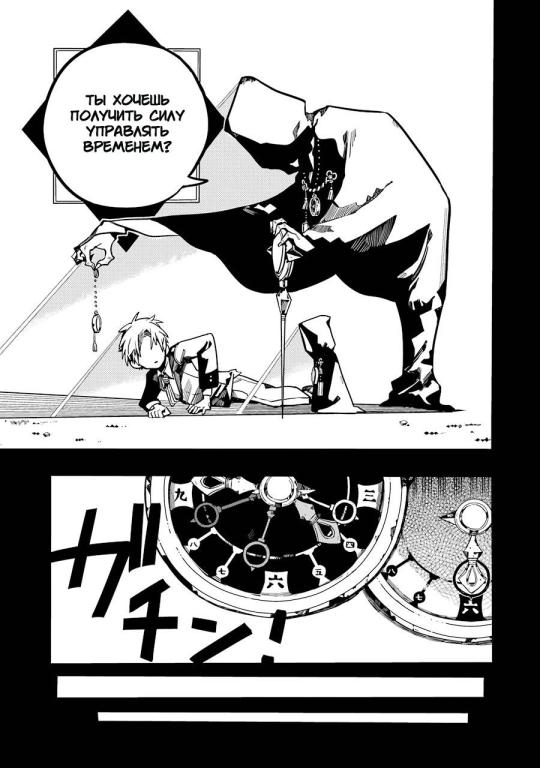
Here, I want to refer to the theory of friend if mine that Aoi died that day and Akane sacrificed his lifespan for her. [But he doesn't remember it. Come to think of it, the flashback abruptly ends with "do you want to gain the power to control time?", continuing the story from the perspective of an unreliable narrator - Akane. I say "unreliable" because it was easy for him to have his memory erased, or even have some of his memories fabricated.
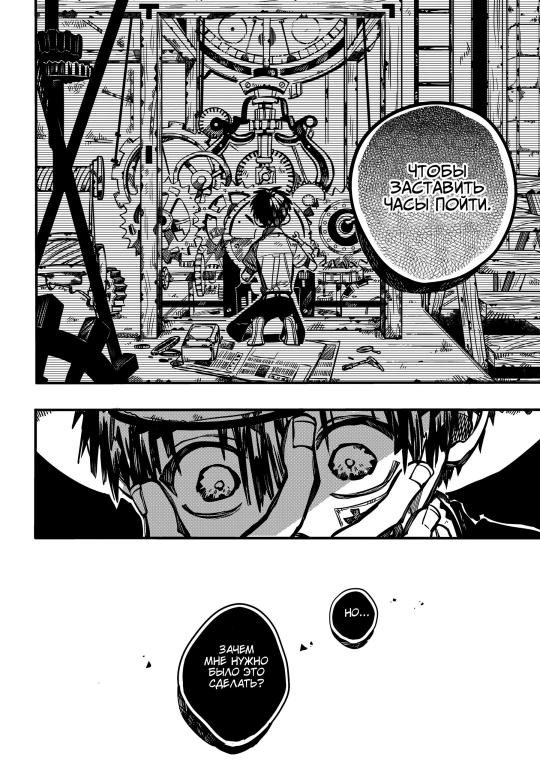
It's worth remembering that the senior guardian can actually rewind time, deleting unnecessary memories. And I don't believe that the guardians of the clock choose a third one for fun. They probably have some kind of selection criteria. Besides, Akane is literally half supernatural, and I don't think that will go unnoticed. Most likely, his days are numbered, like Yashiro's. Maybe he wasn't supposed to die in the first place, but he probably sacrificed his lifespan to correct a terrible misunderstanding. He thinks that after graduation he will simply stop being a guardian of the clock and return to his normal life, but what if everything is played out in such a way that he does not remember the first and most important point of his contract: in exchange for Aoi's life, he gave up his future?]
Also, Akane is very traumatized by what happened. I already said that the reason why he clings to Aoi so madly could be his trauma that day. Just like how Tsukasa got fixated on the idea of "knowing more about Amane" because he discussed it before Kou traumatized him with his revelation, Akane got fixated on the idea of "enjoying the time spent with Aoi and confessing my love to her because I love her and want to be with her" because he also talked about it with Aoi before the Guardians put her in danger.
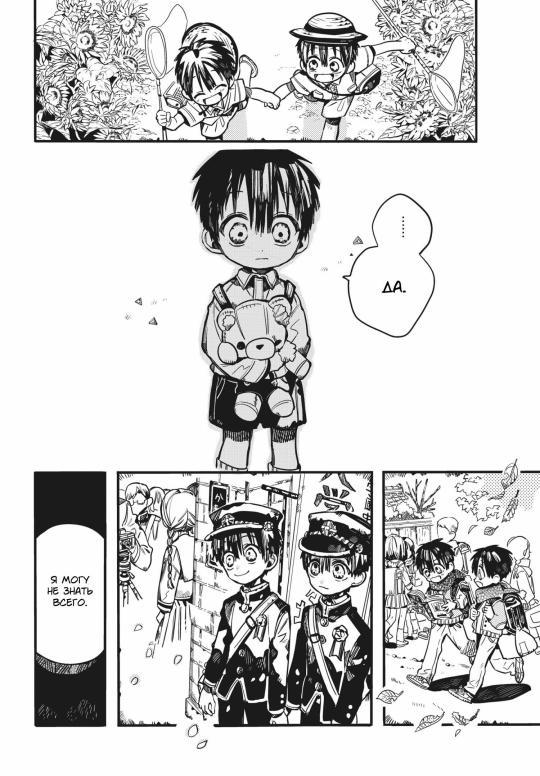
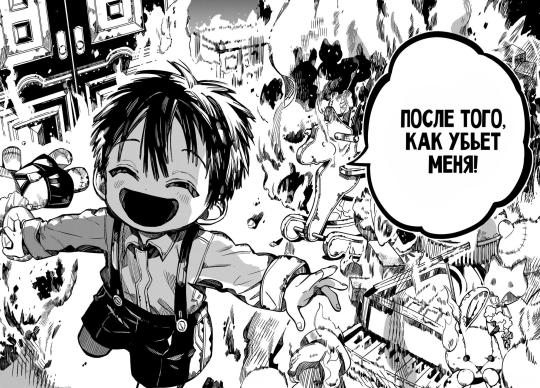
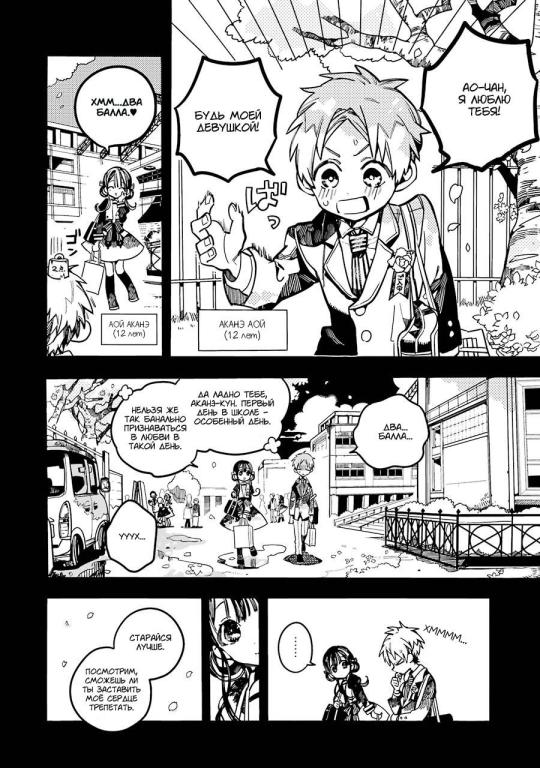
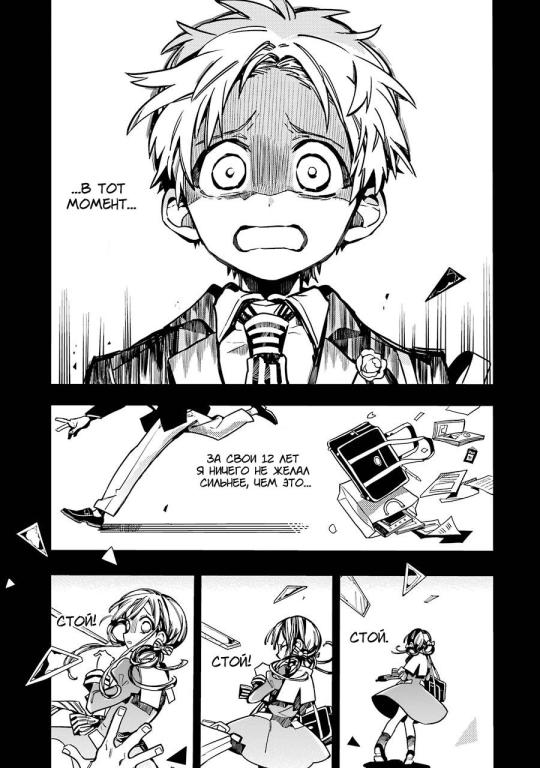
That's why he doesn't act like a normal person anymore, and that's why he's becoming less and less like his calm younger self. Akane made a contract with a supernatural in exchange for the life of a loved one and became half supernatural, changing internally, but mostly because of the trauma and fear of losing Aoi rather than the effects of the supernatural specifically.
The boy who came back to Aoi after that day was a slightly different person. He acted differently and hid a lot of things, and that's why there was a distance between them that grew wider as the years went by. This isn't an "Akane is hiding something" level problem, it's an "Akane has really changed a lot" level problem.
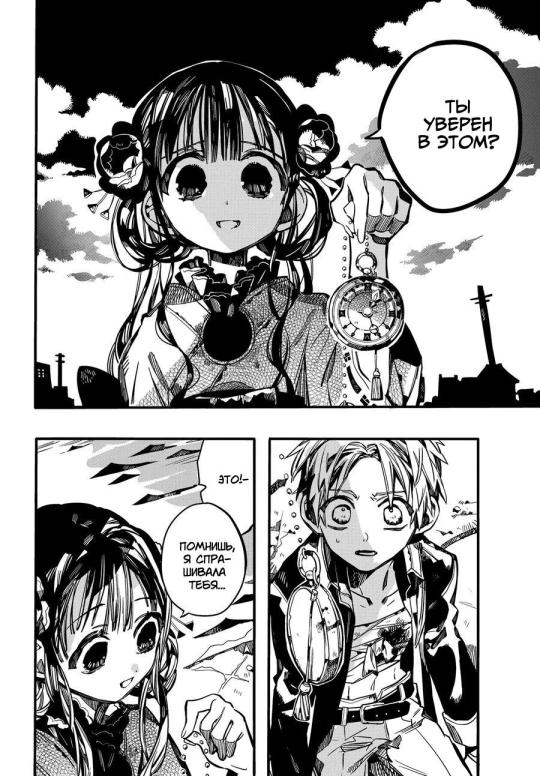
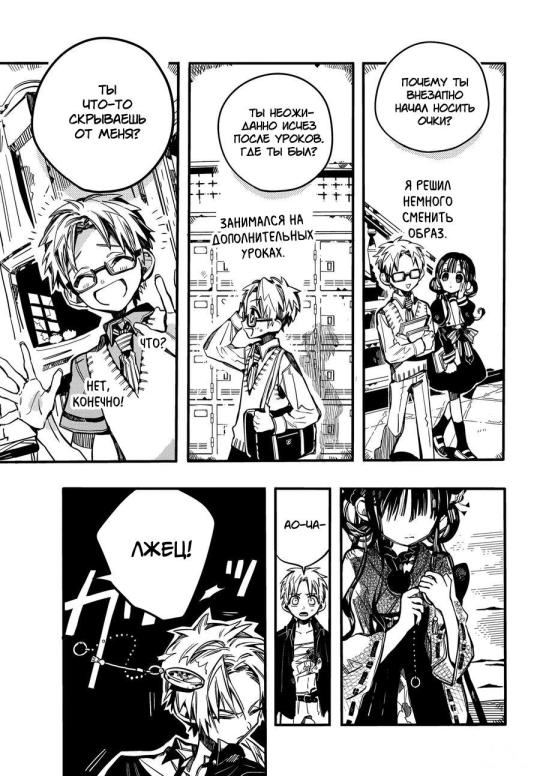
So Aoi, who was initially comfortable around him, starts to feel weird. She stops being playful and teasing around him like she used to because Akane has become so obsessed with the idea that she's slowly starts pushing him away.
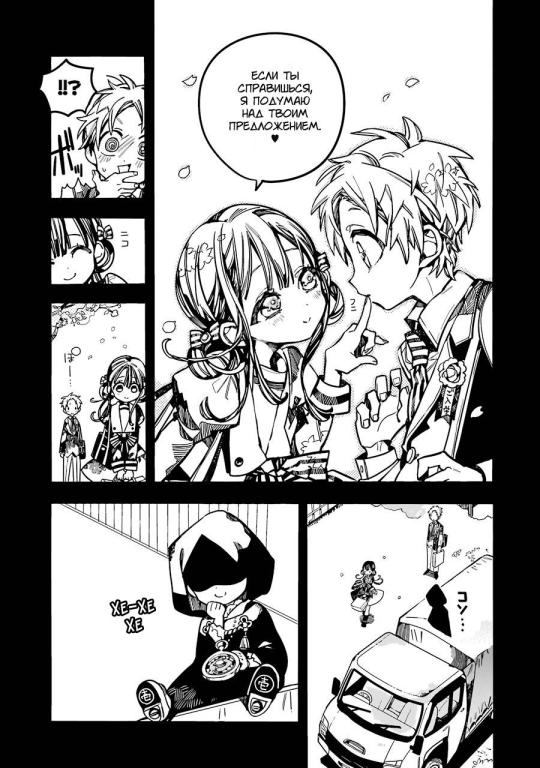
Eventually, the tension reaches a breaking point and Aoi is pushed to such a stalemate that she lays hands on the person closest to her, Akane, because she thinks that will solve her problem.
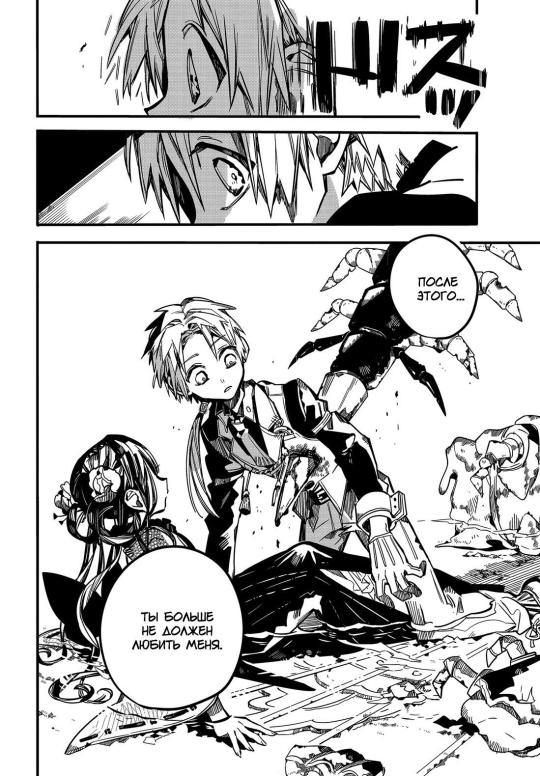
Continue in the next post 🙌🏻
Part 1
#tbhk#jshk#jibaku shounen hanako kun#toilet bound hanako kun#Long post#Character analysis#Plot analysis#Analysis#Aoi akane#Akane aoi#yugi tsukasa#yugi amane#amane yugi#tsukasa yugi#yugi twins#Hakubo#Sumire#Sumire akane#Akane sumire#No 6
37 notes
·
View notes
Text
Thoughts about how different mediums of a same story may give you different views (and rambling about the Tower of Heaven)//TW: violence
Lately I've been wondering about how manga readers might have very different visions than anime watchers of a same story, because althought the plot remains the same, some little details can change our whole perception of a story.
This reminded me of the first time I read Fairy Tail and how terrified I was at how cruel and dark the Tower of Heaven's arc is.
Jellal's face (that by that time, were only an 11-years-old kid) drippling blood while being tortured shocked me so much as a kid and I still find it one of the most disturbing scenes in the manga, lol.

In the anime, the content itself is the same. We know the kids are slaves that go throught different kinds of abuse, however, I find the manga way gloomier and more graphic. And althought part of it might be just a personal opinion, it's not entirely without basis: Mashima uses different techniques in his art to represent facts whitin the story than the animators, and it leads to a topic I really love: semiotics - how we interpret images, and how detais can be used to convey a certain felling throught art.
Colors and composition helps A LOT creating an atmosphere and causing a feeling on the reader. Proportionally speaking, a manga doesn't have colors, but it has it's own alternatives - the Tower of Heaven arc, in comparison to the rest of the manga, uses a lot more black and hatching.

One can argue some scenes are still "visually darker" in the anime, since it has the advantage of being able to play with shadows and colors in a broader aspect; however, since Fairy Tail is not an anime that changes it's saturation or colour pallete, the loud colors in most scenes end up not helping building the same dreadful atmosphere.

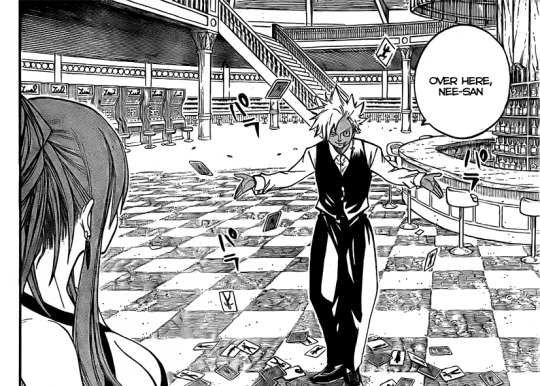
(It doesn't mean you can't make a scary story using bright and colorful tones, tho. A great example is the movie Midsommar. But it's not an easy task!)
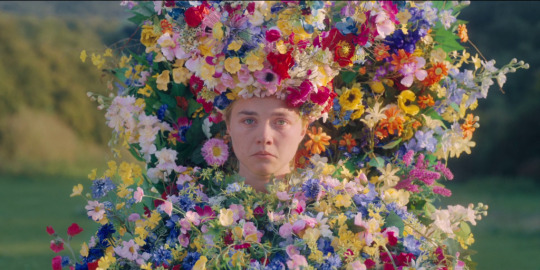
Erza's childhood memories in the manga also carry a "dirtier" feeling; the kids are always covered by bruises, and the background is rougher. Also, the anime chooses to represent slavery in a more fanciful way: the kids wear stylized handcuffs and are assaulted with magic attacks, what inevitably softens the scenes by distancing them from real life slavery.
In a story, an act of violence will always be more shocking if your brain is able to automatically make a connection with real life. Seeing blood conveys a feeling of disconfort easier than a character being hit by a wave of magic, even if the author tells you "this is painful"; that's why some people say they started to find difficult to watch horror movies involving kids after becoming parents, because after experenciating something in real life, they connect with fiction harder.
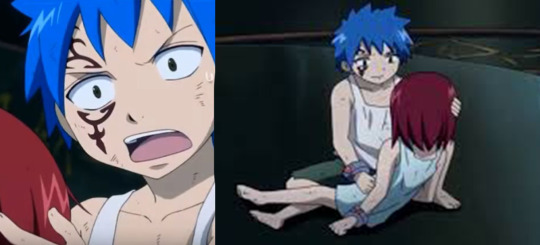

The above scene causes me very different feelings in each media. In the manga, the despair in Jellal's face when seeing they removed Erza's eye is much clearer, and his skinny body, his eyes filling up with tears (he doesn't cry in the anime) shows not only a feeling of worry, but of utter dread and helplessness. All that helps endorsing the fact that, doesn't matter how brave he is, they are still just fragile kids, unable to protect themselves from the cruelty of the world around them.

I want to make it clear, though, that this is not in any way meant to be a critique to the animation team, or an affirmation that one type of media is better than another. We all have our personal preferences, but each media has it's target audience and objective. Fairy Tail's animators certainly do know how to convey the same feelings on the public, they just choose not to, for a variety of reasons. Probably because the anime is aimed for a broader and younger audience, many scenes have been softened or censored somehow. Also, animation consumes more labour than a manga page, so unless you have a lot of time and investment, the art tend to be simpler.


So do you think it affects the plot, Siren?
In my opinion, yes, even if just in a subtle way. In the manga, I think this raw brutality helps Jellal's character to gain a more interesting complexity. To me, he feels less like a hero and more like what he actually is: just a really kind and brave kid trying his best to protect his friends.
Another major change they made in the anime was removing the ambiguity (something that happened more than once in Fairy Tail's adaptation, such as in the famous kiss scene), leaving clear since the beginning that Jellal was a victim of a mind controlling spell; while in the manga, until Urtear's confirmation at the end of the arc, we do not know for sure if he have been brainwashed or just convinced to adore Zeref.
And as much as I can see why some fans might hate it because it leaves room for people to see Jellal as a bad man, I (as someone who is not afraid of loving evil characters, heh), find it interesting and somehow enriching to the plot, because it gives the whole arc a reflection: is extreme suffering, specially at such an young age, capable of changing someone so much?
We are left questioning what did "Zeref" say, or do, that made him change so much. And having so many real life examples where despair has made people easy victims of manipulation throught faith or falling into extremist ideologies, after we seeing Jellal's pain and fragility in a tangible way, it's not that hard at all to understand how he went insane and managed to drag all the other slaves along with him.
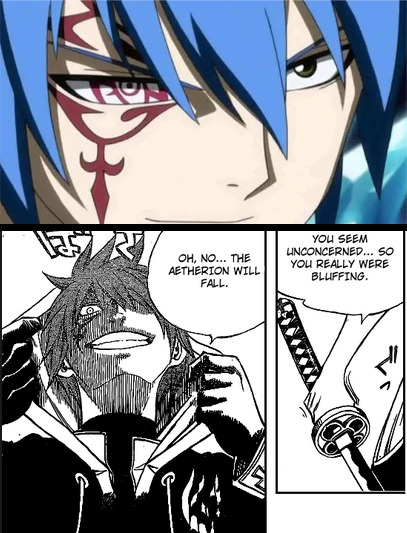
Also, I think it makes it easier to understand Erza's empathy towards him. Jellal and Erza are characters connected not only by the affection they nourish for one another, but also for sharing the same pain. She is the only person that fully understands the horrors he lived in the tower, since they were the only kids that have been in the torture chamber. And althought she never tries to justify Jellal's actions, Erza does not only show him compreension, but she feels guilty for not being able to retribute his protection and prevented him from losing his mind.

That doesn't mean, tho, that there weren't many other clues he was not acting on free will: be it his grotesque change of personality, his hysterical laughter out of nowhere or his motivations that doesn't hold (because they were never his to begin with). To me, all that at first glance makes him closer to Batman's Joker, someone that grew insane after so much suffering, than a villain that's genuinely just plain selfish and thirsty for power. And that only makes me find him a creepier villain, since personally, I find sadism and insanity way scarier than ghosts.


So this is just a looong collection of thoughts about how small choices can change a lot the "feeling" we get from a scene or a character. I hope someone can find it interesting too. There are many other examples of adaptations where it happened, and if you remember one you'd like to share, I would love to hear!
Last but not less important, all the love for Mashima's art, the Tower of Heaven arc (that is a personal favorite) and Jellal, a character I deeply love and one that holds for sure the strongest spirit in the manga for being able to become such a kind and mature man despite everything he has been thought. ♡

#Fairy Tail#Jellal fernandes#erza scarlet#jerza#semiotics#manga x anime#anime vs manga#Tower of heaven#Sorry this is too long#Also english is not my main language but I hope this is still understandable sorry#My motivation for writing this was: HOW THE HELL do I see so many people saying Jellal didn't suffer#I tried to understand how people read/watch fairy tail and get this interpretation and this text was born haha#it justifies nothing actually but it's such a fun analysis to do#Bro never had a moment of peace in his head for 27 years and tried to k*ll himself at least 3 times canonically he just needs a hug#siren's thoughts#about stories#plot analysis
48 notes
·
View notes